What Are You Saying Meaning in Marathi
a. Form some exclamatory expressions by using the adjectives you know, like
b. Can you guess what are they saying?
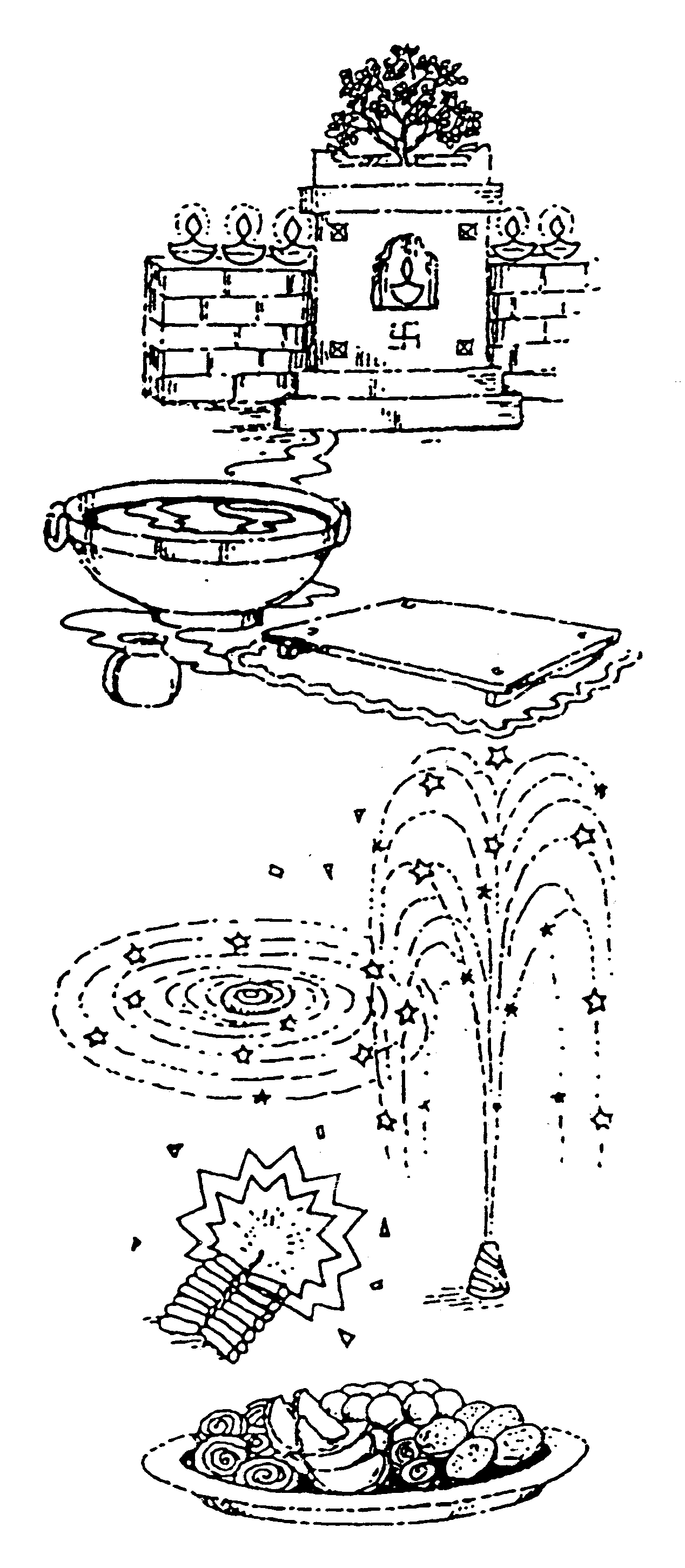
In India Diwali is a large and important festival. Diwali is [always] in the two Marathi months of Ashvin and Kartik. The last two days of the month of Ashvin and the first two days of the month of Kartik together constitute the four days of the Diwali festival. At this time grain ripens in the field. So people are full of joy ['in joy].
According to tradition the first day of Diwali is Narkachturdashi. The second day is Laxmipujan. The third day is Padva. Bhaubeej is on the fourth day.
In 1994 Diwali was in the English month of November. But Diwali isn't always in November. It is sometimes in October. Diwali is celebrated ['they celebrate'] after the Kojagiri full moon [in Ashvin]. The air then is clear and cool.
On Narkacaturdashi people get up early. They apply fragrant oils and powders when they bathe. They set off firecrackers. Then they make holiday snacks. They eat spicy preparations such as cakli, civada and shev and sweet preparations such as karanji, ladoo, and shankarpalas.
The next day they worship Laxmi. Merchants set off large chains of firecrackers in front of their stores. On the third day i.e., on Padva - a wife will wave a tray of lamps before her husband. And on Bhaubeej a sister will wave a tray of lamps before her brother.
Diwali is a festival of lamps. On Diwali they light 'sky lanterns'. They light lamps. Diwali means new clothes, sweet food, presents, guests, [play] forts, rangolis, incense sticks, sparklers, firecrackers, fragrant powders and oils. Everybody celebrates Diwali with enthusiasm and joy.
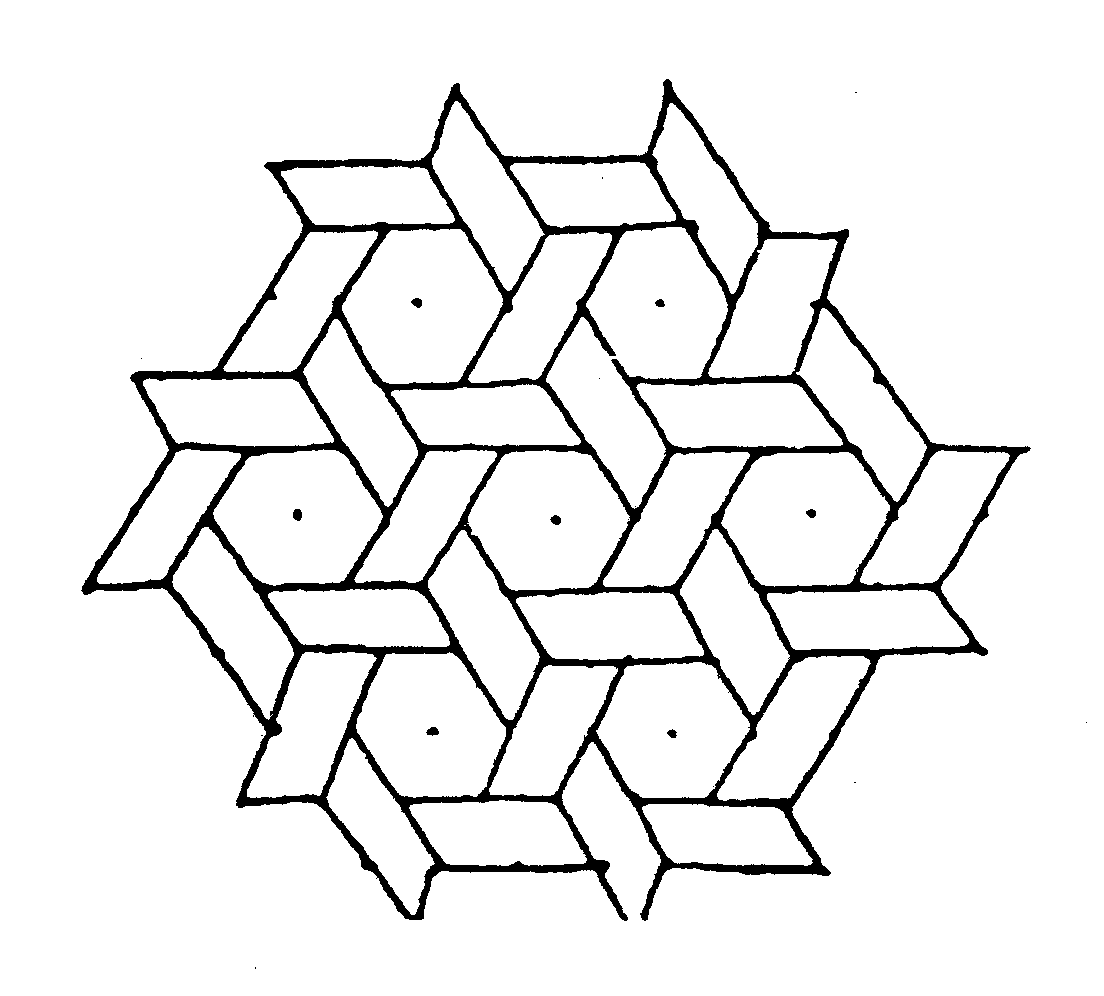
VOCABULARY
Nouns
Adjective and Adverbs
Postposition
-
Verbs
Phrases
WORD STUDY
GRAMMAR
1. Constructions without a Subject
In Marathi general statements are frequently made without a subject, using the plural form of the verb in the third person.
| | Diwali is celebrated after the Kojagiri full moon. |
| | The next day they worship Laxmi. |
The equivalent constructions in English either are in the passive voice or they have a third-person subject in the singular on plural, e.g., 'one says' or 'they say'.
Note that there are also some constructions without a subject in Marathi where the third person singular neuter form of the verb is used.
| | Because of the sunshine it is always warm during the day. |
| | At night it is mostly cool. |
In the equivalent English construction, the subject 'it' cannot be omitted.
2. Ordinal and Cardinal Number
Ordinal number are variable adjectives derived from the cardinal.
| | | |
| | | |
| | | |
| | |
Note that after
Note that the interrogative pronoun
A. In the reading text on Diwali there are many sentences without a subject where the verbs is in the third person plural.
Identify these sentences and insert an appropriate subject (the 'understood' subject).
B. Complete the following sentences. :
 -
- | - | And what all do you do? |
| * | I help mother. And I make the sky lantern. Then I also make a fort. This year I'm going to make a really big fort. Mitch, will you come too to make the fort? |
| - | Yes, of course I'll come. But what do you mean by 'fort'? |
| * | By 'fort' I mean like Shivaji's forts, like the fort at Sinhagad. |
| - | But where are you going to make it- and how? |
| * | Near the door of our house. I'll get mud and rocks. We'll make a hill out of that. We'll make a pond next to it. We'll plant some trees. We'll get some clay soldiers from Tulsibag - and guns. Then we'll build a nice fort. |
| - | I'll also come with you to Tulsibag. Then we'll make the fort. |
| * | Yes, good. We'll have fun. |
VOCABULARY
Nouns
Adjective and Adverbs
Postpositions
-
-
Verbs
Phrases
A. In pairs. Practice the above conversation.
B. One at a time around the class in a chain.
Sit in a circle and take a count of the class using cardinal numbers. Then ask each other
C. Identify sentence with the Auxiliary verb from the text
D. Talk about seasons and festivals in America by using the forms of the Auxiliary.
E. Are these dishes sweet
F. Group activity.
Do you know what they are doing?
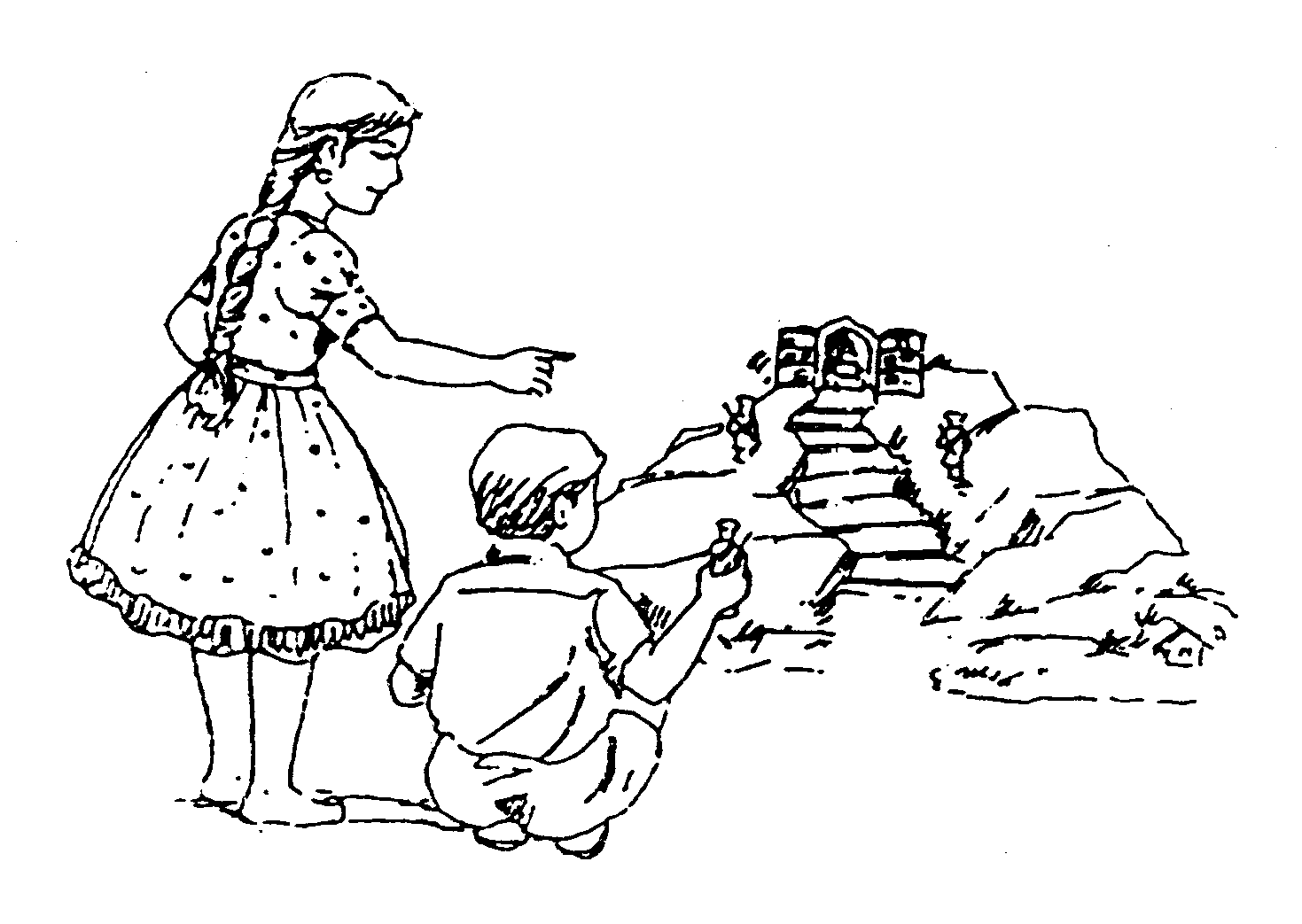
Unit Two
Travelling
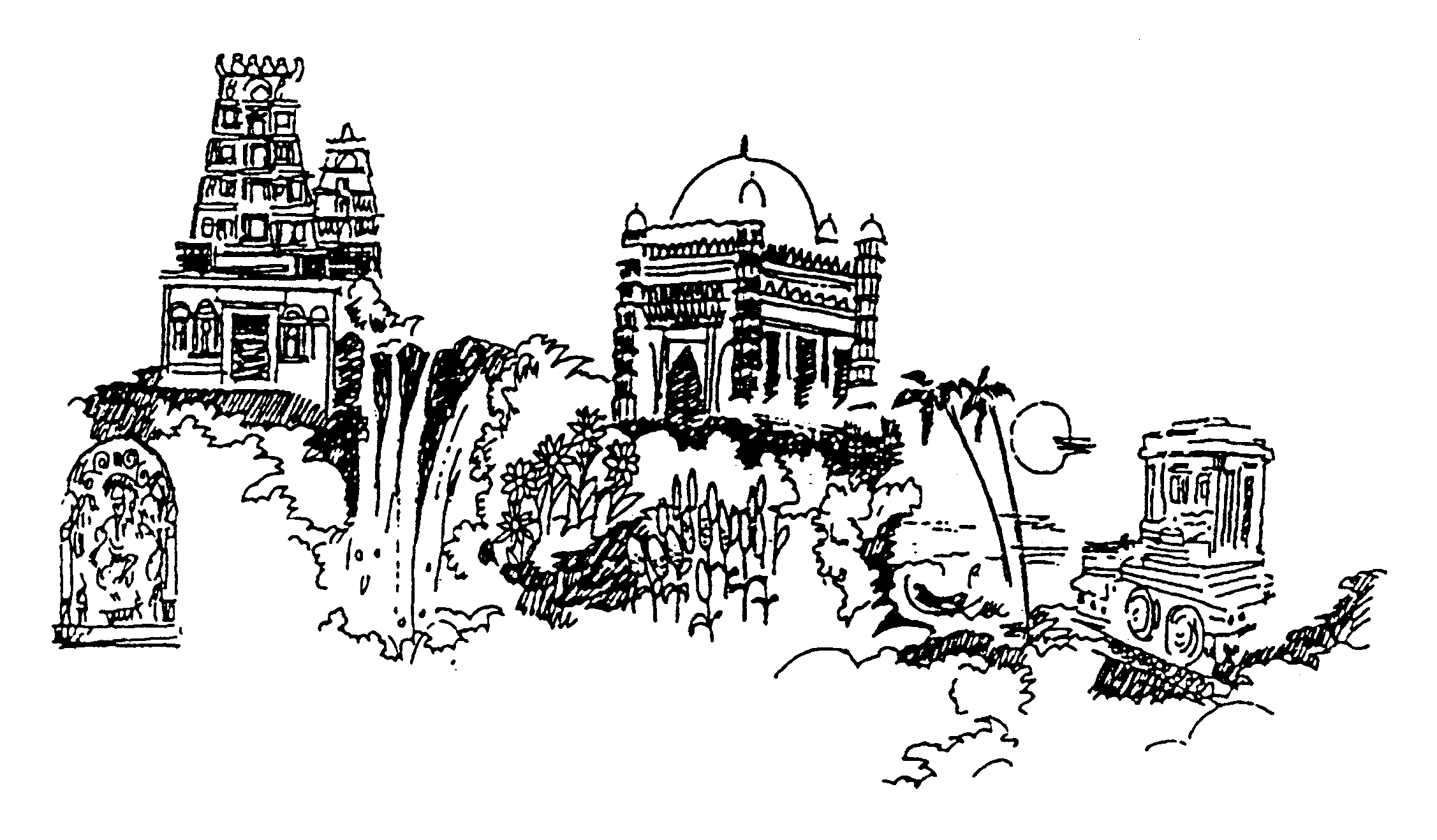
In November 1992 my one German friend came ['had come'] to India. I made a trip to southern India with her. We rented a car. We went around for ten days altogether with that car.
We went via Belgaum to Bijapur. There we saw the famous Golgumbaz mausoleum. We stayed overnight at Bijapur and went to Badami the next day. We saw the caves there and went on to Hampi. Later we saw the famous temples at Halebid and Belur. From there we visited ['saw'] the water fall at Jog Falls, saw such towns on the seacoast as Karwar, Gokarna, and Guhagar and returned to Pune.
We saw very large fields of sorghum and sunflowers in Karnataka. The state of Karnataka is very beautiful.
Group activity:
Discuss 'the journey of South' taking the following points into consideration.
| - | Jon, what did you do during ['in'] your vacation? |
| * | I went ['had gone'] out of town. |
| - | Where did you go? |
| * | I went to Delhi and Mussoorie. |
| - | How long did you stay there? |
| * | Ten days altogether. |
| - | How did you go to Delhi? |
| * | I went by plane. |
| - | Did you go alone? |
| * | No. Kathy was with me. |
| - | Kathy, what did you [two] do in Delhi? |
| * | We wandered around a lot. We met people. |
| - | What else did you do? |
| * | We bought a lot [of stuff]. We had a lot of fun. We ate Panjabi dishes. |
| - | What all did you see there? |
| * | We saw the Red Fort, the Teen Murti Bhavan, the Jama Masjid, and a lot of museums and exhibitions. |
| - | What else did you do? |
| * | We got chappals and clothes in Chandni Chowk. We had a lot of fun in Delhi. |
Group activity:
Describe your own travels in India following the pattern of the questions in the dialog.
VOCABULARY
Nouns
Adjectives and Adverbs
Postpositions
-
-
Phrases
WORD STUDY
You may have noticed that in the first reading the instrumental postposition, which you have consistently learned as -
GRAMMAR
Reviewing the Perfect Aspect.
-
Let's compare the Imperfect and Perfect paradigms of the verb
| Imperfect | Perfect | ||
| | | | |
| | | | |
| | | | |
| | | | |
| | | | |
Note especially unlike the Imperfect, the third person plural ending in the Perfect are differentiated in terms of gender.
For the third person singular in the Perfect the masculine ending is -
| Singular | Plural |
| | |
| | |
| | |
| | |
| | |
| | |
1. Note that the third - person forms of intransitive and transitive verbs in the Perfect are the same, but their sentence structure is different.
While forming the Perfect, the subject of a transitive verb takes the postposition -
| Imperfect | Perfect |
| | |
| | |
| | |
2. Remember that the postposition -
| Imperfect | Perfect |
| | |
| | |
| | |
| | |
| | |
In all the sentences in the Perfect above the verb is governed by the noun which functions here as a grammatical subject. The 'agent' doing the action
3. Note that there are some 'special verbs' among the transitive verbs, e.g.,
In forming the Perfect with these verbs the subject remains the grammatical subject even in the Perfect and thus governs the verb form.
| | |
| | |
| | |
It might be helpful to list the verbs, transitive and intransitive, in their various categories in the Perfect - using the masculine singular ending throughout.
1. Regular intransitive verbs in the Perfect.
| | | | |
| | | | |
| | | | |
| | | | |
| | | | |
| | | | |
| | | | |
| | | | |
| | |
2. Intransitives verbs with irregular bases in the Perfect.
| | | | |
| | | | |
| | |
3. Regular transitive verbs in the Perfect with the agentive
| | | | |
| | | | |
| | | | |
| | | | |
| | | | |
| | | | |
| | | | |
| | | | |
| | | | |
4. Transitive verbs with irregular bases in the perfect.
| | | | |
| | | | |
5. Special transitive verbs that conjugate like intransitive verbs.
| | | | |
| | | | |
| | | | |
A. Group activity.
Talk about a recent trip you have taken using the questions below:
B. Describe yesterday's routine of Mr. Patil, as given below.
C. In pairs. Discuss and compare your routine of yesterday with your friend by completing the table below.
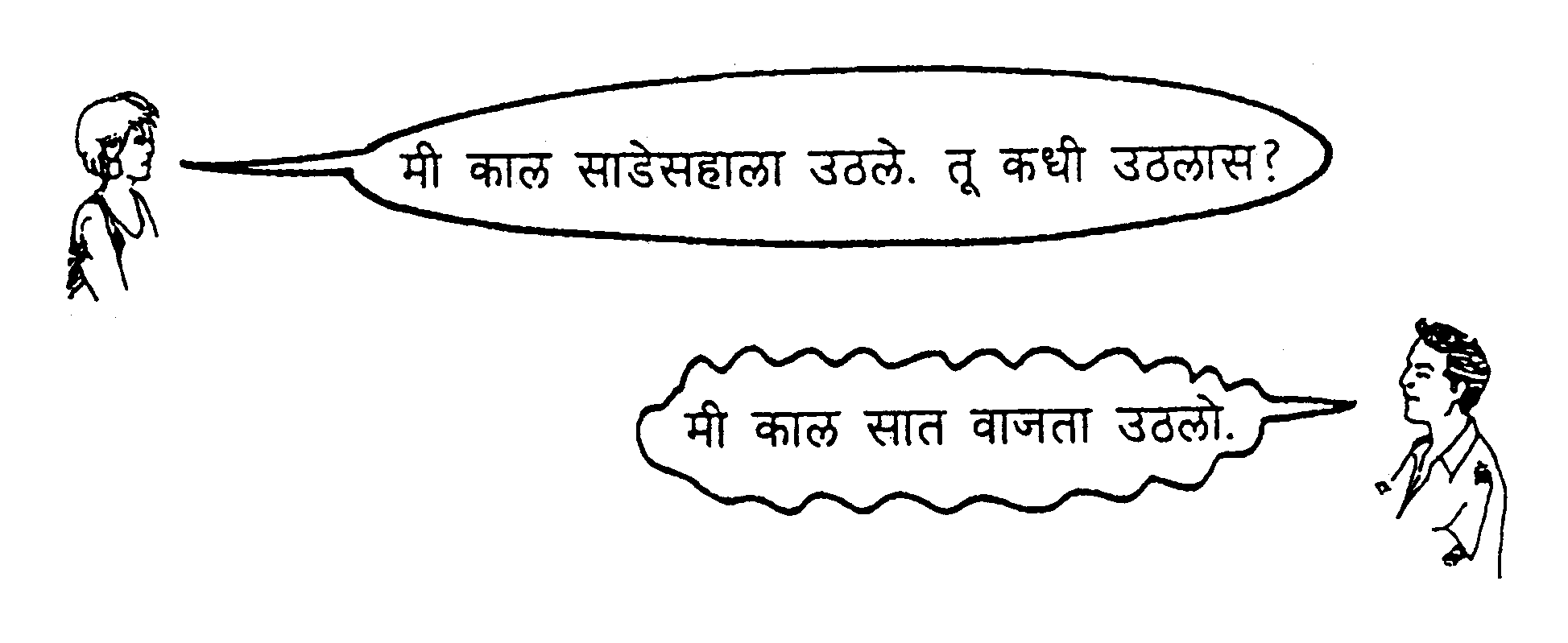
| | | | |
| | | ||
| | | ||
| | | ||
| | | ||
| | | ||
| | | ||
| | | ||
| | | ||
| | | ||
| | | ||
| | | ||
| | | ||
| | | ||
| | | ||
| | |
D. One by one around the class in a chain.
Talk about arranging a room, following the pattern of conversation given below.
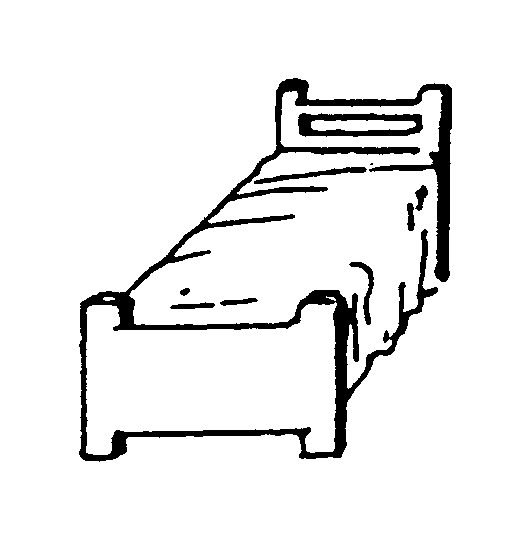
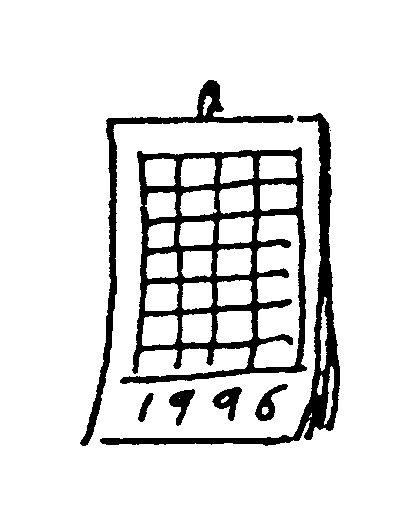
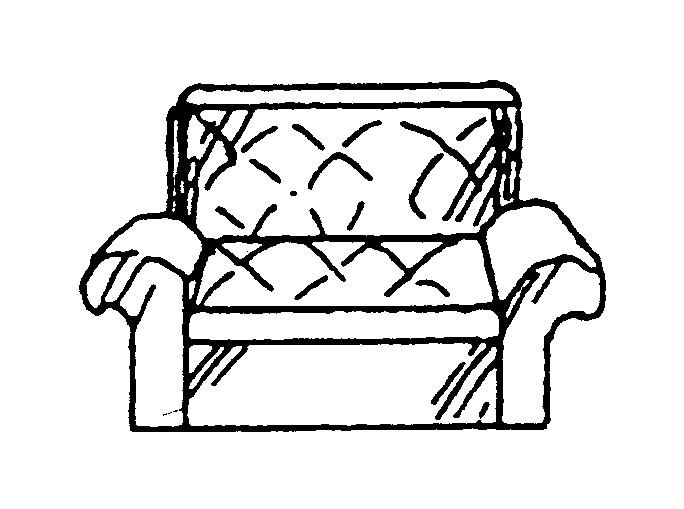
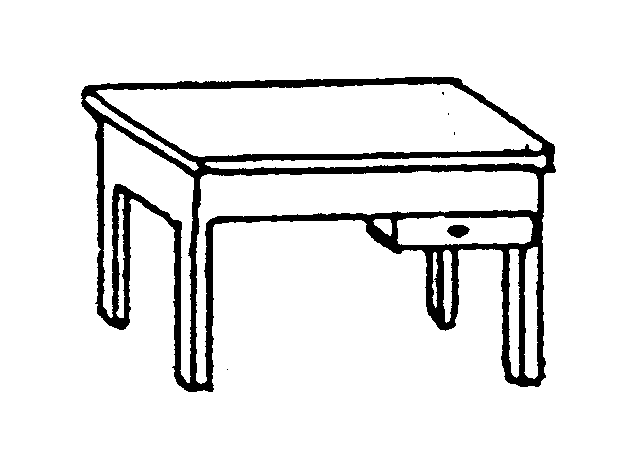
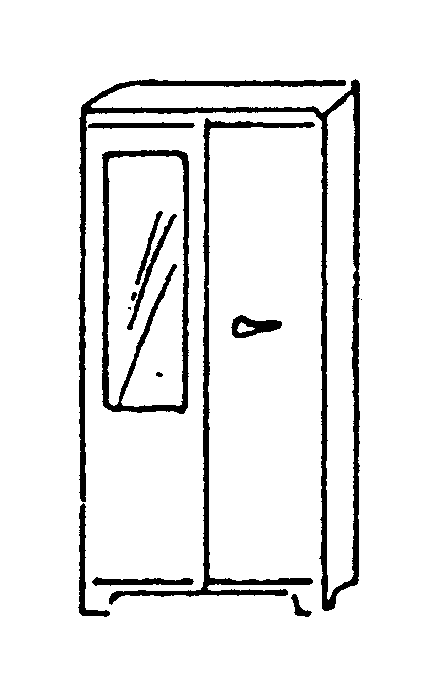
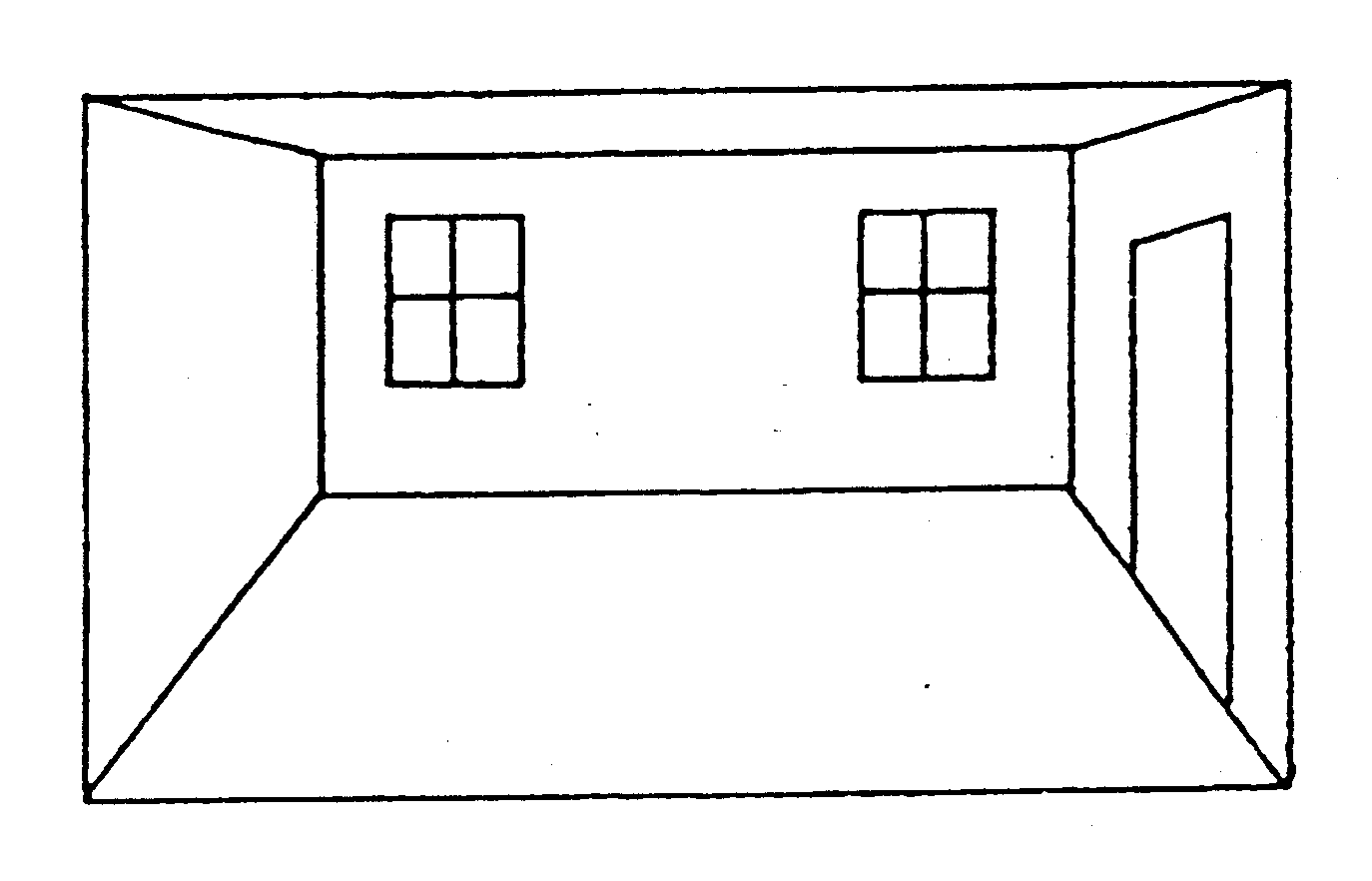
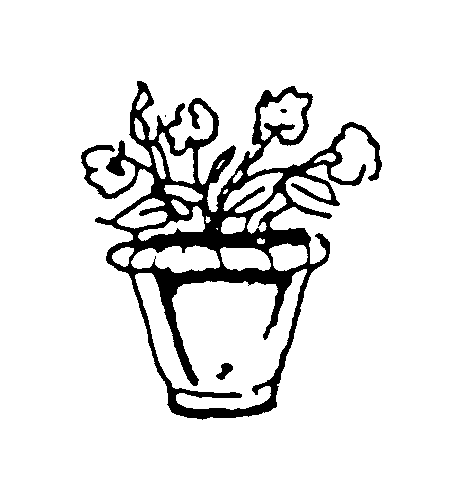
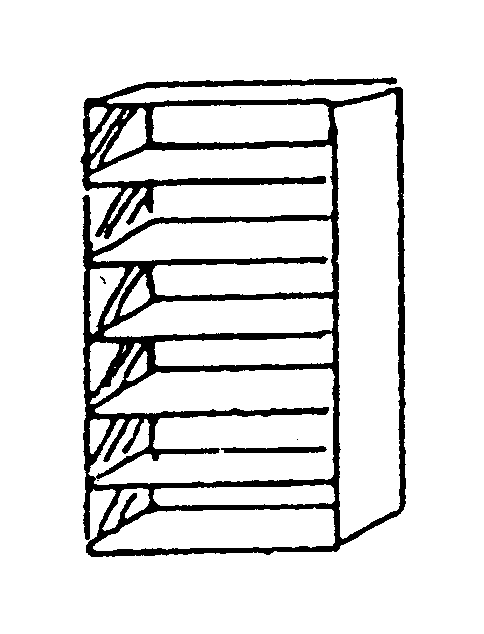
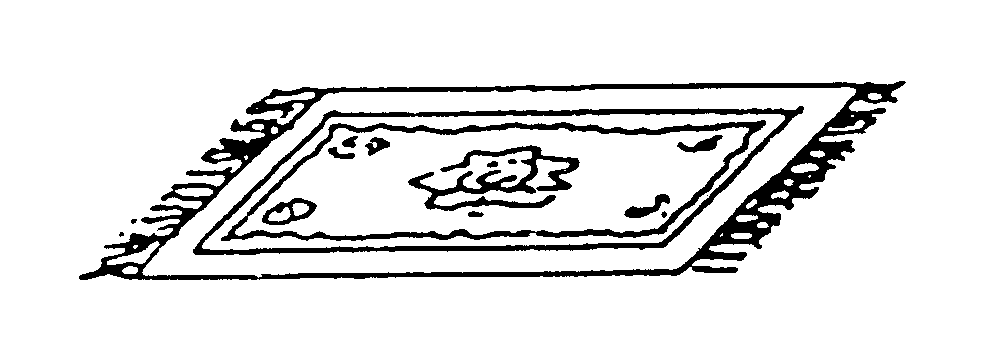
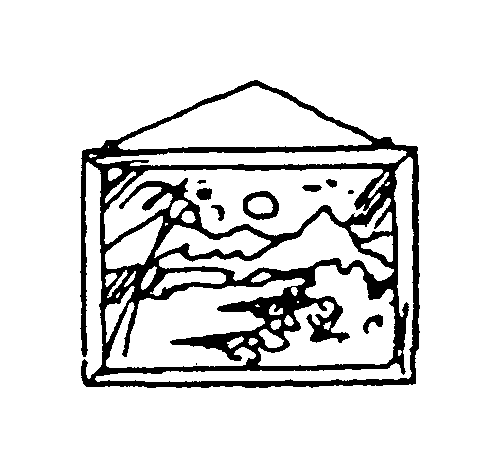
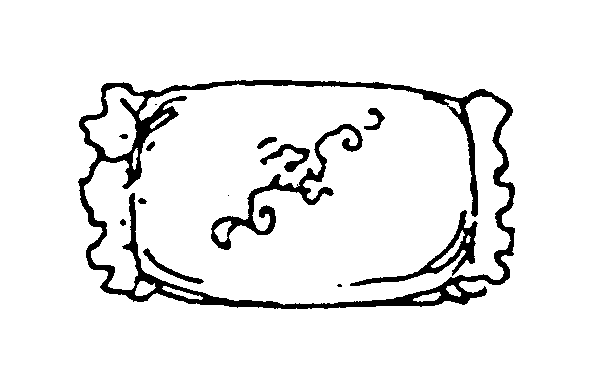
[
E. Group activity.
Ask the question
F. From sentences in the Perfect using the words of groups 3, 4 and 5 from the list on the preceding page.
G. Construct sentences by combining appropriate words from each column:
| | | | |
| | | | |
| | | | |
| | | | |
| | | | |
| | | | |
| | | | |
Neeti and Rebecca are discussing places to visit in Maharashtra.
| - | Rebecca, which towns and places worth seeing in Maharashtra have you seen? |
| * | Very few. Phaltan, Aurangabad, Mahabaleshwar. |
| - | Have you seen Battis Shirala? |
| * | No. What is that? |
| - | Battis Shirala is a certain town. On Nagpanchami lots of people go there. |
| * | Nagapanchami - does that mean a cobra festival? |
| - | Yes, On Nagpanchami they worship cobras. I was in the town of Battis Shirala once on Nagpanchami. On that day lots of people there catch snakes and cobras. I once touched a cobra with my hand. |
| * | My gosh! The cobra is venomous, isn't it? Didn't you get scared? |
| - | Sure I did! But a lot of people and children there held cobras in their hands. They hung them about their necks. |
| * | Really! |
| - | Yes, indeed. Which is why thousand of tourists go there. There is also one very nice old Shiva temple there. We saw a lot |
| | of peacocks there and old tamarind trees. |
| * | Did you have fun there? What are some more nice places in Maharashtra? |
| - | There are some hill stations in the Sahyadhri mountains. Like Mahabaleshwar. |
| * | Where have you gone? |
| - | I've seen Matheran and I've been to Amboli. |
| * | Where is Amboli? |
| - | It is in Ratnagiri District. The source of the Hiranyakeshi River is very close by there. There is a Vishnu temple at the source. We went there by foot. It is a very beautiful place. |
| * | You really did like Amboli then? |
| - | Yes, Amboli is very nice. What's more, there are nice towns in the Konkan - that is, along the seacoast of Maharashtra. |
| * | And they are? |
| - | The town of Guhagar and the seacoast there are very nice. And the seacoast and beaches at the place called Ganapati Pule are nice. |
| * | During vacation I'll go there with Chris. |
a. Using the conversation as a model, find out what places in Maharashtra each one in your class has visited - and at least four facts about the place and the things they saw there.
b. Interview at least two members of your host family and find out what place in Maharashtra they recommend for a visit, how to get there, and what to see. Report what you learn back to the class.
| - | Chris, where shall we go during the vacation break? |
| * | Shall we go to a hill station? |
| - | Yes. OK. Let's go to Matheran. |
| * | Rebecca, where is this Matheran? |
| - | It's on the Pune - Mumbai road. Near Neral. |
| * | So how shall we go? |
| - | Let's take the 6 am Deccan Express and get off at Neral. |
| * | And from there? |
| - | From Neral a small train goes all the way up to Matheran. Let's travel on it. We 'll have fun. |
| * | And Let's stay in a cottage up there. And wander about by horse and on foot. |
| - | Yes. We'll have a lot of fun. So it's decided. Will you make the reservations? |
| * | Yes, sure I will. |
A. Group activity.
Plan a trip to Amboli. Practice a conversation on the pattern above with your classmates. (Nearest airport : Belgaum, 64 k.m. Nearest railway station : Belgaum. Bombay - Miraj - Belgaum 568 k.m. Road: Bombay - Mahad - Chiplun - Amboli 549 k.m.)
B. In pairs.
Which other places do you know in Maharashtra? Which ones would you like to see? Why? When and How?
VOCABULARY
Nouns
Adjective and Adverbs
Conjunction
Verbs
Phrases
WORD STUDY
Grammar
Using
This is a peculiar construction in Marathi that is possible only with the personal pronoun
As can be seen in these examples, an English equivalent will be the construction with 'Let's'. This construction is often used in Marathi for planning to do something.
a. Complete the following sentences.
b. With help of the table given on the following page compare the distances.
| | |
| | |
| | |
Use the postposition
| - | How far is Varanasi from Delhi? |
| | 765 kilometers. |
| - | How far is Trivandrum from Delhi? |
| | 2780 kilometers. |
| - | So Varanasi is closer to Delhi than Trivandrum. |
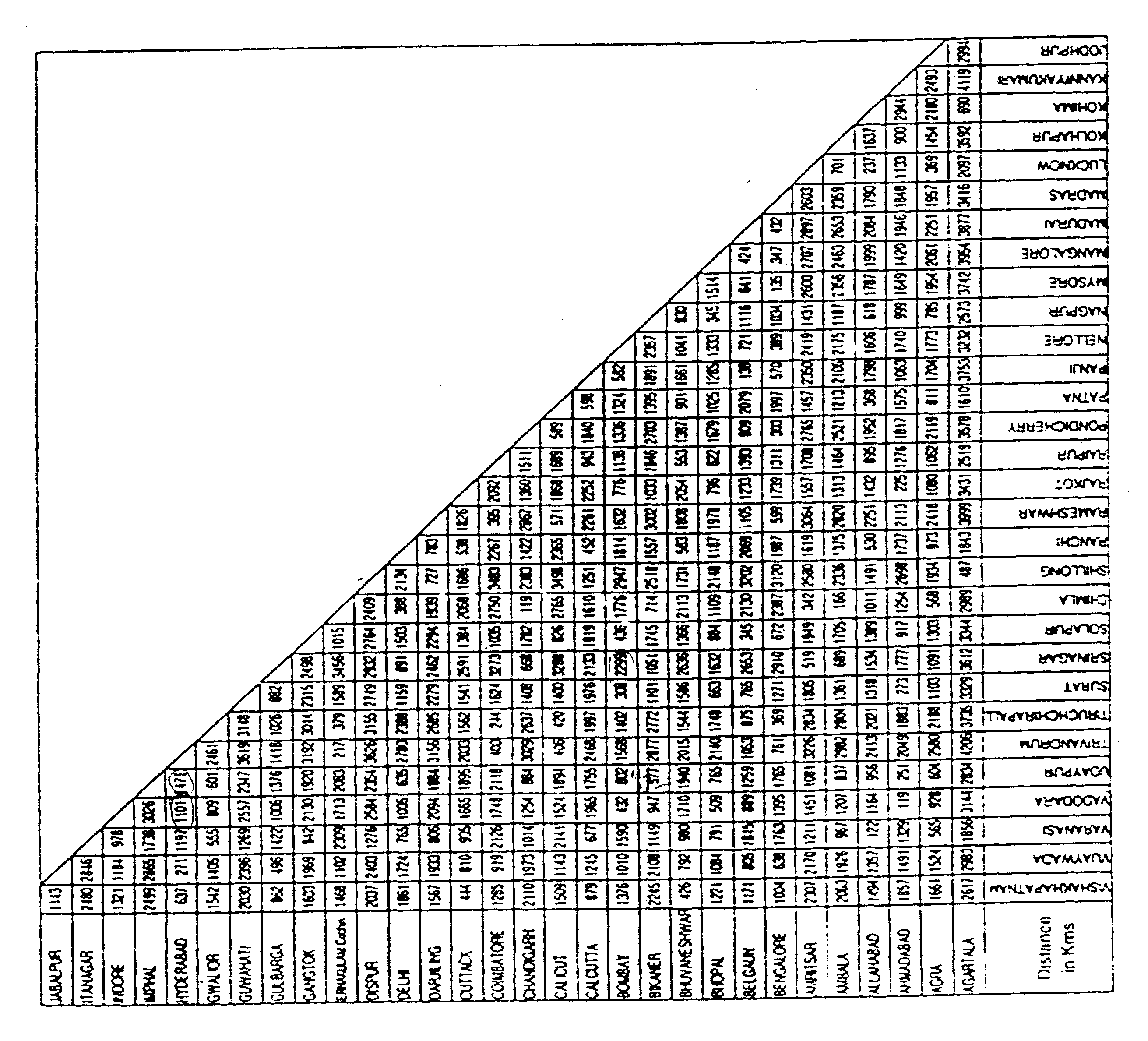
c. Ask each other questions with help of the chart given on the previous page. Some possibilities are given below:
d. One by one around the class in a chain. Construct sentences following the given patterns:
1. Comparative
A.
B.
2. Superlative
A.
B.
C.
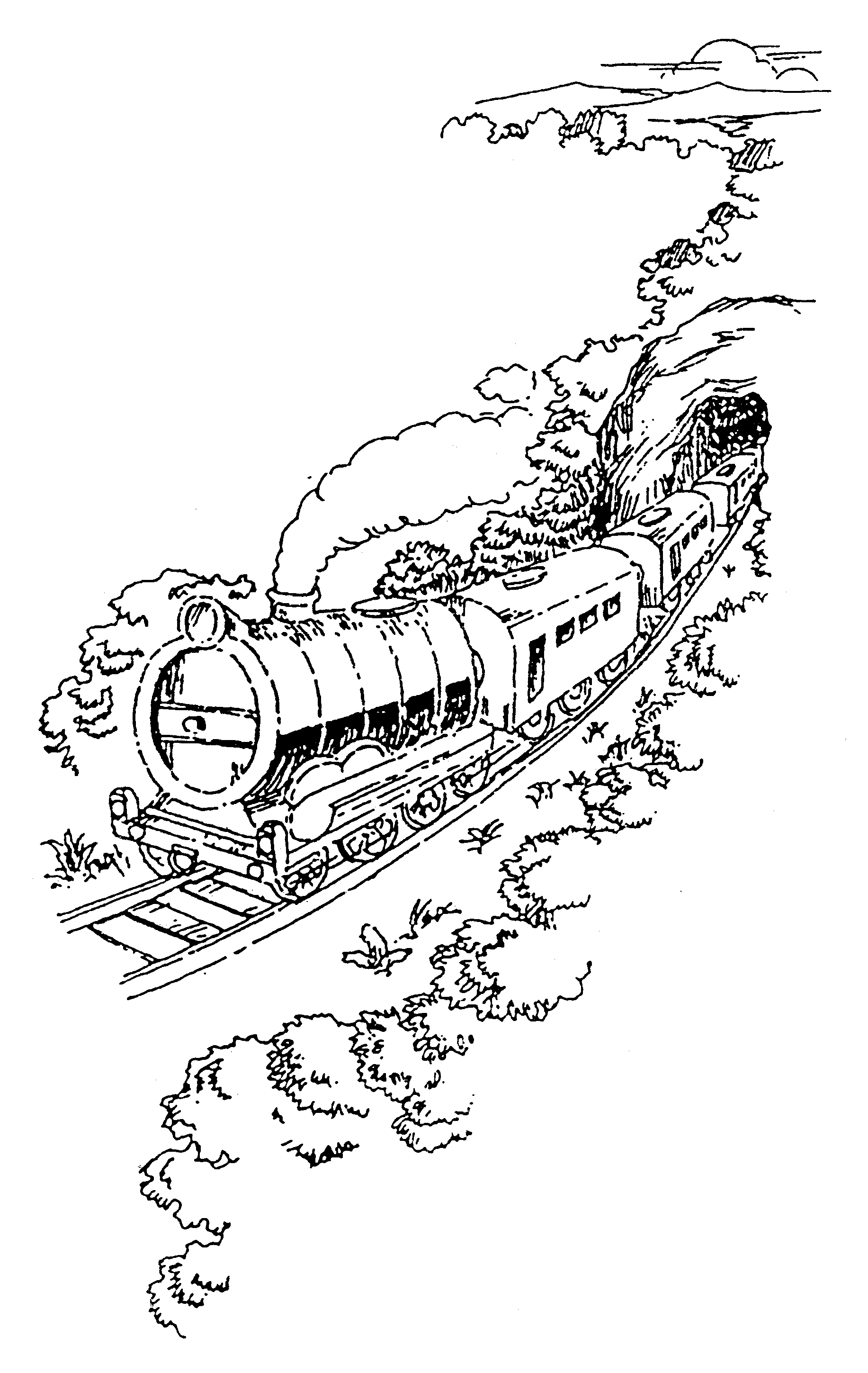
The choo-choo train that chugs along Leaves a trail of smoke behind. Let's watch the backward - running trees, Let's go and see my uncle's town!
My uncle's town is very large With lots of gold and silver marts. Let's see what all the show's about!
Uncle, your wife is quite the cook! Let's eat chapatis every day And bananas in milk and gulabjam!
My Uncle's such a big shot that He'll buy a thousand yards of silk, So let's all don new coats and pants!
My uncle's wife, who looks so fair, Will ask, "whose spoiled brats are these? Let's see who these nieces and nephew are!"
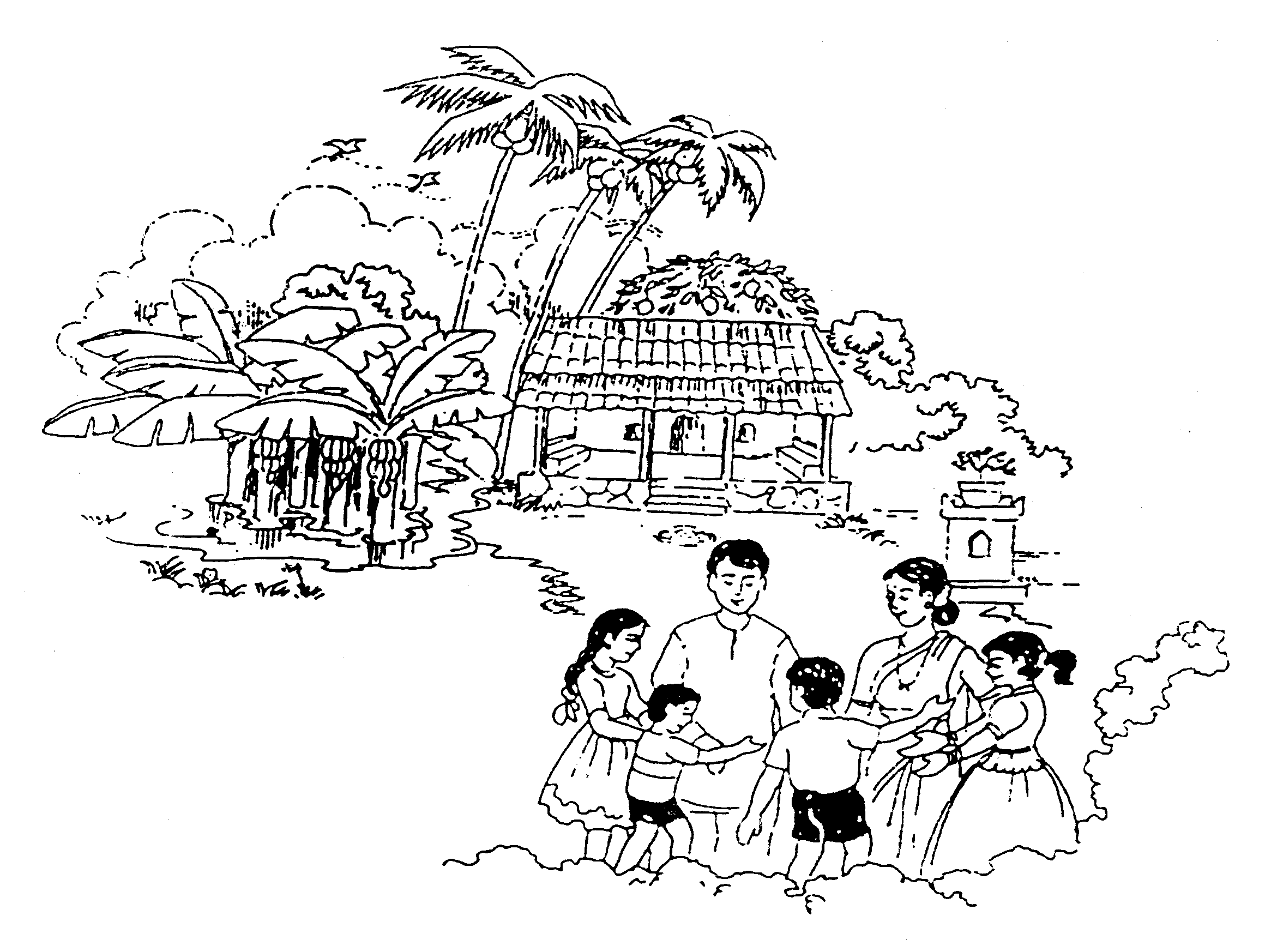
Unit Three
Feeling and Liking
Kathy is writing to her Marathi friend, Sudhir Waghmare, who lives near her home in Washington, D.C.
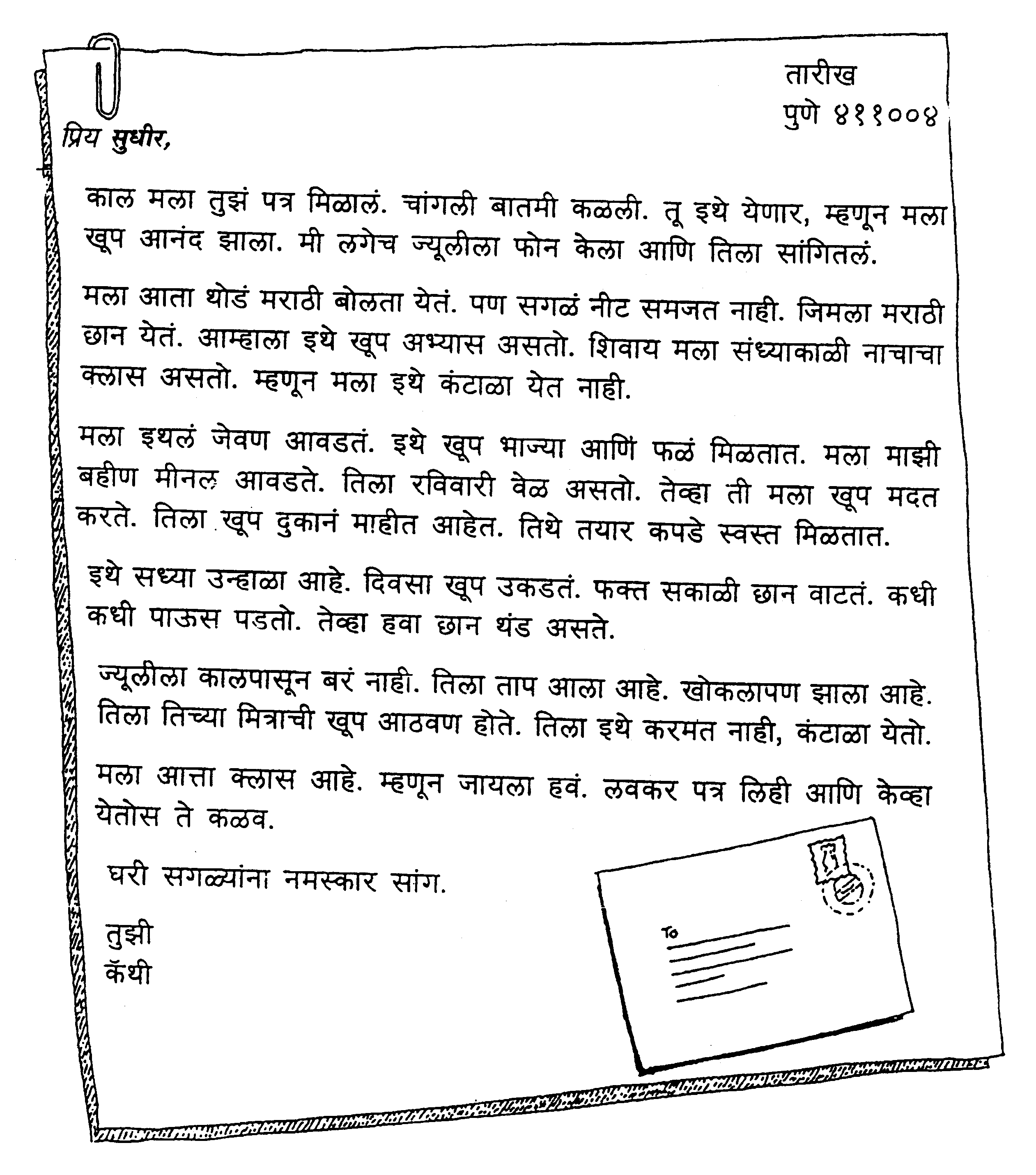
Date
Pune 411004
Dear Sudhir,
Yesterday I got your letter and came to know the good news. I am very happy because you are going to come here. I immediately called Julie and told her.
I can speak a little Marathi now. But I don't understand everything properly. Jim knows Marathi well. We have a lot of studying [to do] here. I also have a dance class in the evening. So I don't get bored here.
I like the food here. You get a lot of vegetables and fruit here. I like my host sister Meenal. She usually has time on Sunday. Then she gives me a lot of help. She knows a lot of shops. You get inexpensive ready- made clothes there.
It's summer here now. During the day it gets really hot. It feels nice only in the morning. Sometimes it rains. Then the air is nice and cool.
Julie hasn't been [isn't] well since yesterday. She has a fever. She's got a cough too. She thinks of ['remembers'] her boyfriend a lot. She doesn't enjoy it here and is feeling bored.
I have a class now. So I have to go. Write a letter soon and let me know when you'll come.
Say hello to everyone back home.
Yours,
Kathy
VOCABULARY
Nouns
Adverbs and Adjectives
Post position
-
Verbs
WORD STUDY
1.
2.
3.
a. Write a letter in Marathi to a Marathi friend, describing your experiences and routine in Pune.
b. Replace the first personal pronoun forms in the given text with
GRAMMAR
Impersonal Constructions.
One of the features of Marathi most striking to native speakers of English is the impersonal nature of many constructions. While English emphasizes the personal agent of an action, Marathi emphasizes the thing done.
There are some sentences both in English and Marathi, where a personal agent is totally absent (e.g.,
| | He earns Rs. 50 / - every day. |
| | He gets bored here. |
In the above constructions the expected agent of the action takes the postposition -
| | Ram falls down. (personal construction) |
| | Ram has a dream. (impersonal construction) |
The verb
| | | John comes. (personal construction) |
| | John comes ['in order'] to swim. (personal construction) | |
| | | John is bored. (impersonal construction : Boredom comes to John.) |
| | John has fun. (impersonal construction : Fun comes to John.) | |
| | | John can swim. (impersonal use : To swim comes to John.) |
| | John can speak Marathi. (impersonal use : Speaking Marathi comes to John.) |
The frequently used impersonal verbs are:
| | to understand | |
| | to understand, to get to know | |
| | to get, receive | |
| | to appear, to look | |
| | to remember | |
| | to feel | |
| | to find | |
| | to be able, to feel, etc. | |
| | to like, to be pleased | |
| | to enjoy, feel at home | |
Note that all these verbs are intransitive.
a. One by one around the class in a chain. Answer the following questions using the vocabulary given in the brackets.
b. Small groups. Find logical and grammatical connections to complete the following sentences by joining parts from A and B:
| A | B |
| | |
| | |
| | |
| | |
| | |
| | |
| | |
| | |
| | |
| | |
| | |
| | |
c. Group activity.
Identify in each of the above sentences the grammatical subject that governs the verb form.
d. Complete the following sentences.
e. One by one around the class in chain.
Ask each other questions following the pattern given below. Some illustrations are given on the next page.
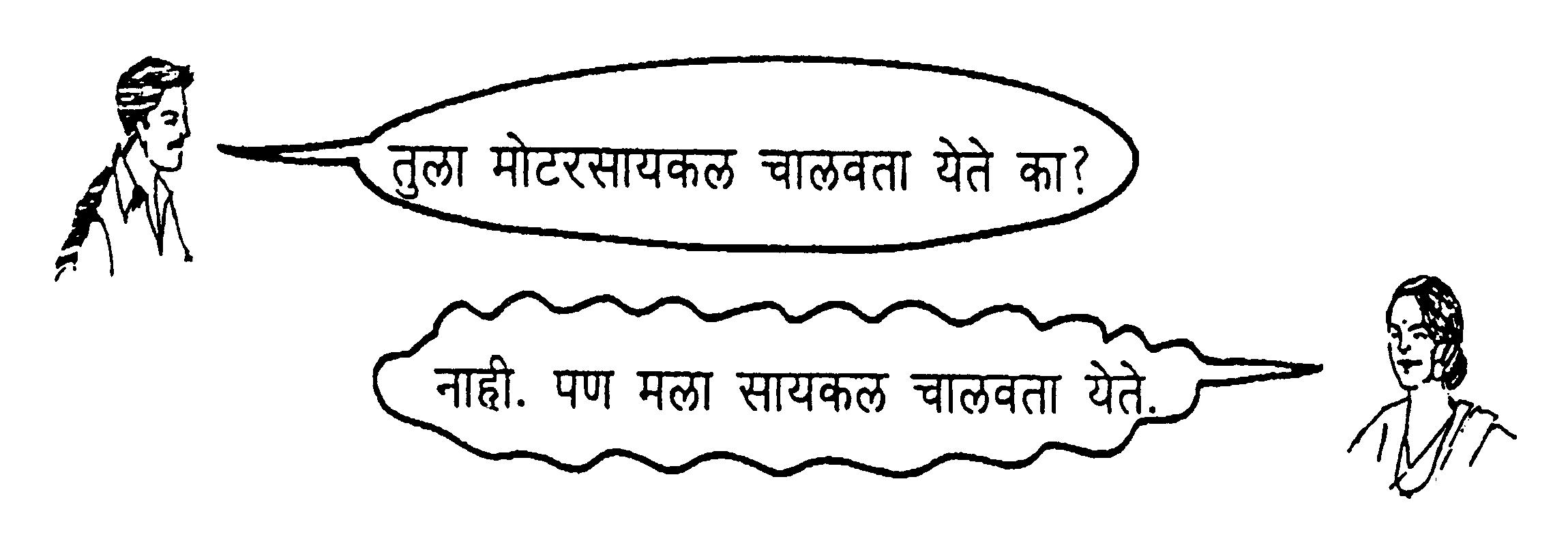
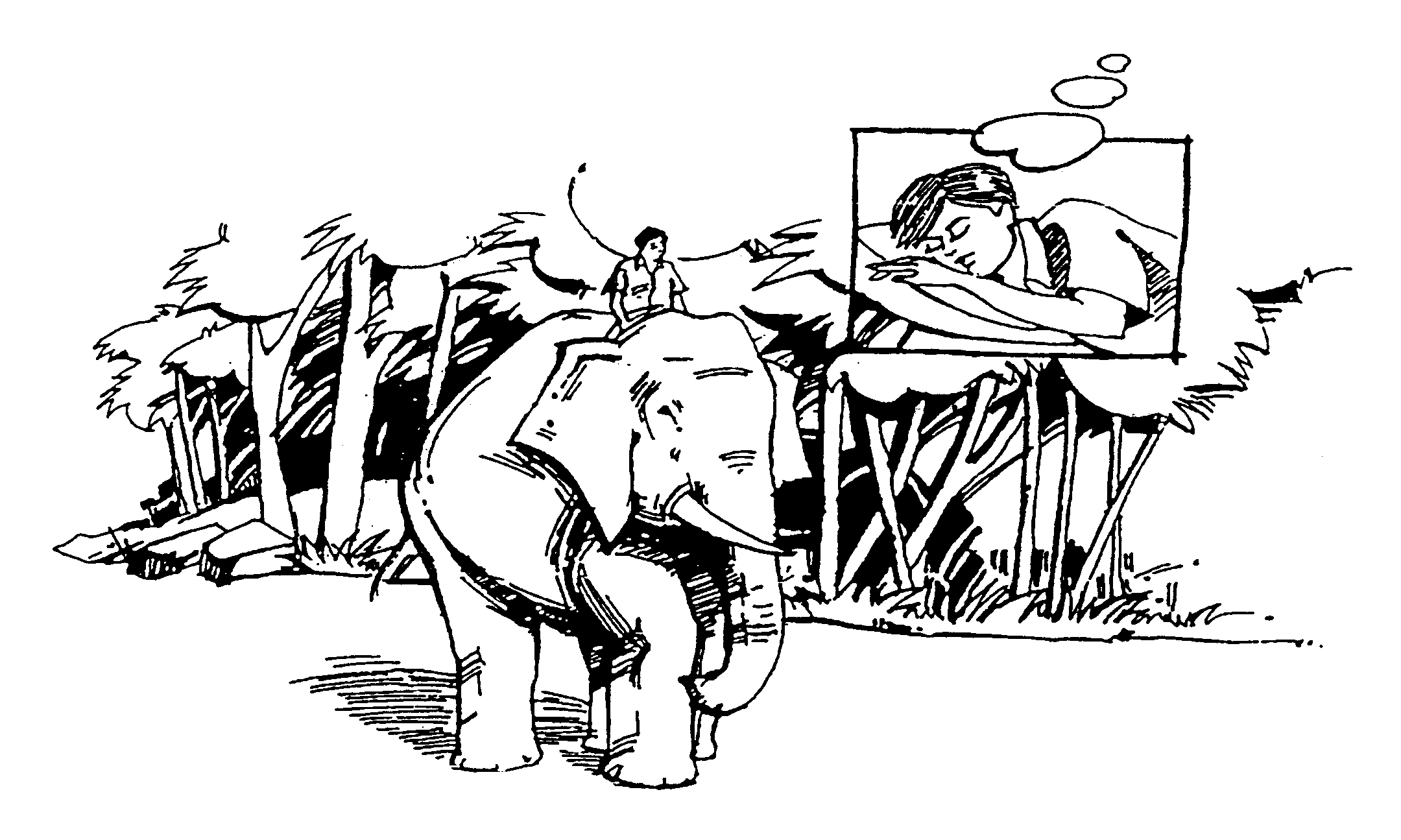 Once there was a boy. His name was Ram. One day as he was wandering about he went walking a very long way. There he saw an elephant. He thought it was fun when he saw the elephant. The elephant was very big and tall. He was standing beneath a tree. Ram rapidly climbed the tree and from off a branch sat down on the elephant's back. The elephant started to walk slowly. Ram thought it was great fun. The elephant entered a dense jungle. There Ram saw monkeys, deer, rabbits and peacocks. Seated on the elephant, Ram easily plucked fruit from high off of a tree. Just then he heard the roar of a tiger. Ram felt afraid ['fear']. He was [so] scared he fell down from off the elephant's back. And he yelled, "O, Mommy!"
Once there was a boy. His name was Ram. One day as he was wandering about he went walking a very long way. There he saw an elephant. He thought it was fun when he saw the elephant. The elephant was very big and tall. He was standing beneath a tree. Ram rapidly climbed the tree and from off a branch sat down on the elephant's back. The elephant started to walk slowly. Ram thought it was great fun. The elephant entered a dense jungle. There Ram saw monkeys, deer, rabbits and peacocks. Seated on the elephant, Ram easily plucked fruit from high off of a tree. Just then he heard the roar of a tiger. Ram felt afraid ['fear']. He was [so] scared he fell down from off the elephant's back. And he yelled, "O, Mommy!" His mother came running. "What happened, Ram?" Ram laughed. He said, "Mommy, in my dream I fell off of an elephant." So his mother laughed too.
VOCABULARY
Nouns
Adverbs and Adjectives
Postpositions
-
-
Verbs
WORD STUDY
GRAMMAR
1. The Imperfect participle V +
You have already come across this verb from in other contexts, e.g., the Imperfect negative (
| | He went walking. |
| | His mother came running. |
| | Wandering and wandering he went a very long way. |
V +
2. Expression of feeling
In Marathi talking about feelings, perception or understanding generally requires a sentence construction that seems alien to native speakers of English. In English the person is the subject of the sentence, e.g., 'He feels happy'. In the corresponding Marathi sentence however the noun referring to the person take -
| | Ram was afraid. |
| | Ram was amused. |
| | Ram smiled. |
| | Ram cried. |
The verb most frequently used in reference to emotions is
| | Ram was afraid of the tiger. |
| | Ram laughed at his dream. |
| | We felt joy at our victory. |
| | We felt sorrow at his death. |
With -
| - | - |
| - | - |
| - | - |
| - | - |
| - | - |
| - |
Similarly we find many constructions of this pattern with the verb
| - | - |
| - | - |
| - | - |
The noun +
| | What was Ram afraid of? |
| | What did Ram smile / laugh about? |
The verb
| | He was happy. |
| | She was sorrowful. |
| | He was in difficulty. |
| | He was satisfied. |
a. Small groups.
Reconstruct
b. Use participle forms V +
c. Small groups.
Construct sentences using
d. Fill in the blanks in the following sentences with
एकदा काय झाले,
पक्षी उडून गेले,
म्हणून झाड उडून गेले!
एकदा काय झाले
गणपतीचा मुकुट घालून
उंदीरमामा आले!
एकदा काय झाले
नातवाने धरला विंचू
म्हणून आजोबाच भ्याले!
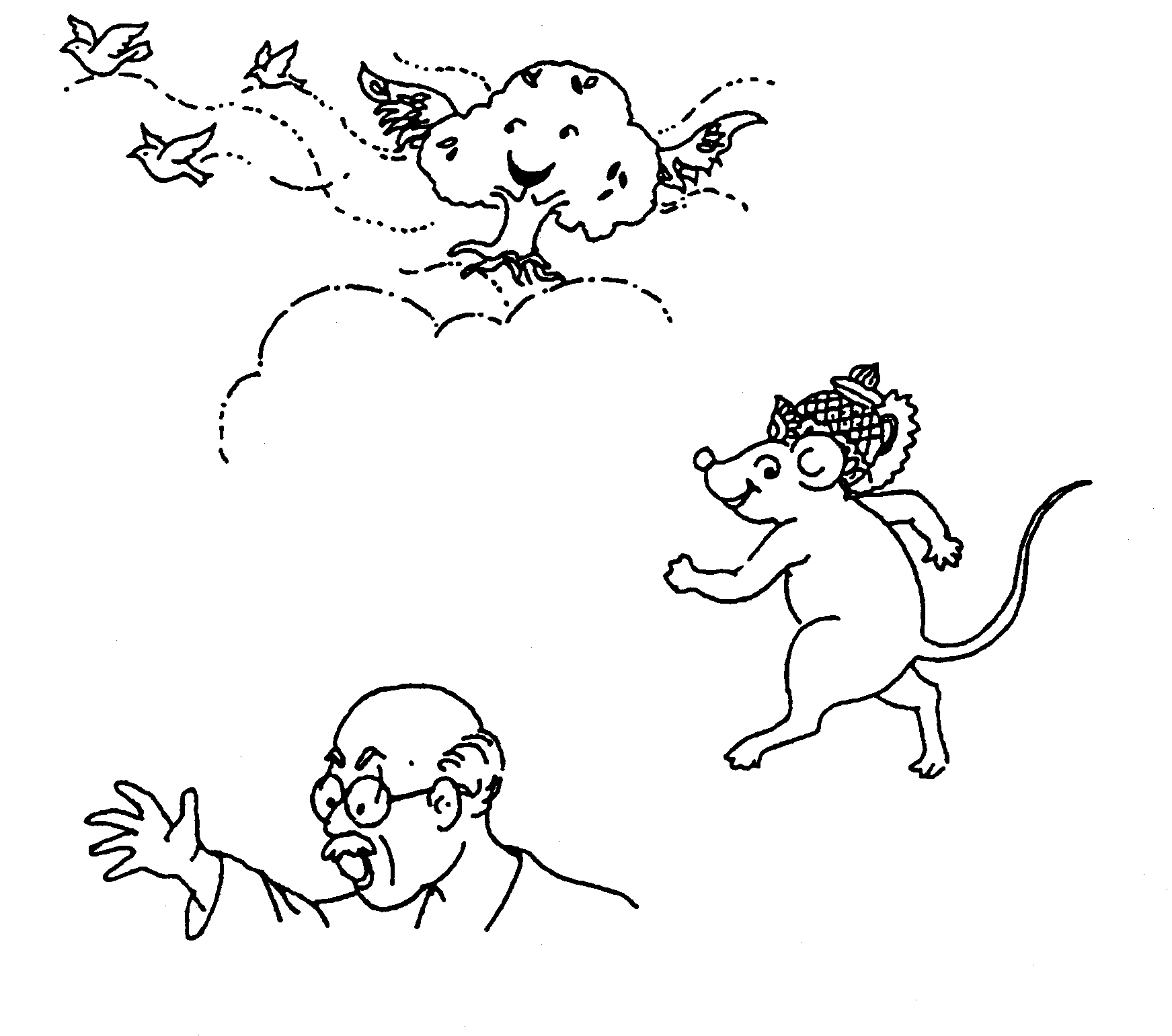 What happened once,
What happened once,What happened once,
The birds went flying away
So then the tree flew off!
What happened once,
What happened once,
Uncle Mouse happened along
With Ganpati's crown on his head!
What happened once,
What happened once,
His grandson picked up a scorpion
So grandpa got scared to death!
VOCABULARY
Nouns
Verbs
One by one around the class in a chain. Answer the question
GRAMMAR
1. V+
Marathi frequently uses two predicates in one construction. One predicate is the V +
| | The birds flew off. |
| | Ganapati put on the crown and came. |
| | Grandpa saw the scorpion and got scared. |
In type (a) the conjugated verb loses its independent meaning and functions almost like an adverb 'away' or 'off'.
In type (b) the conjugated verb retains its verbal meaning. V +
| | Ganapati put on the crown, and then he came. |
Some verbs like
2. Derived Adverbs.
Adverbial phrases of time sometimes prove confusing to native speakers of English.
| | One day Ram went to the jungle. |
| | On that day he saw an elephant. |
| | Come on Sunday. |
| | She comes to India each year. |
The forms like
In the following examples adverbial phrases of time are formed either with the
| | → | |
| | → | |
| | → | |
| | → | |
| | → | |
| | → | |
| | → | |
| | → | |
| | → | |
| | → | |
One common adverbial expression of frequency starts with the adverb
Other adverbial expressions of frequency are formed with the number +
| | | |
| | |
a. One by one around the class in a chain. Form sentences following the pattern.
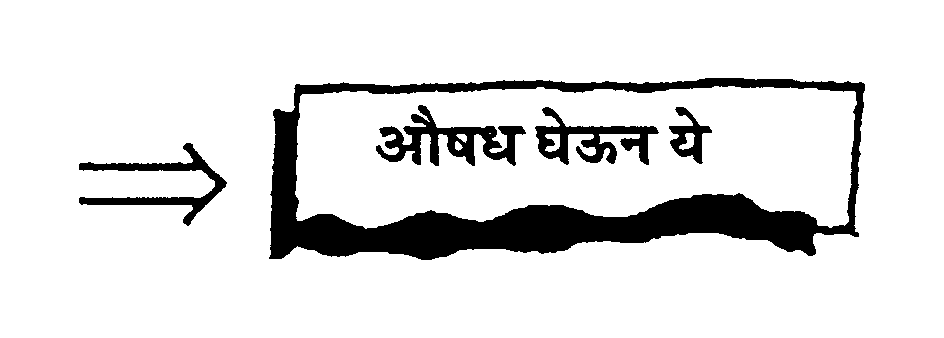


b. Complete the following sentences :
............... (
............... (
.............. (
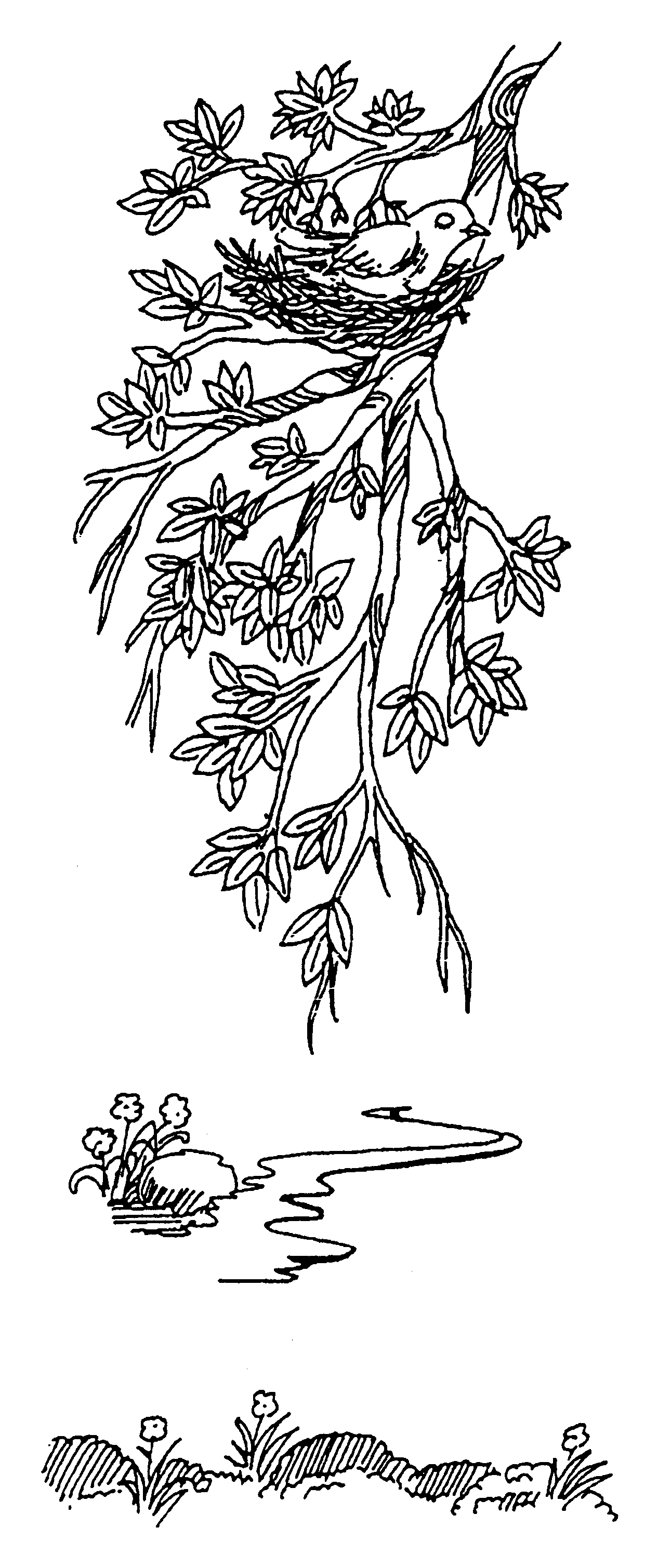
सारीकडे उजाडले
डोळे तरी मिटलेले
अजूनही!
घरट्याच्या दारापाशी
डोळ्यांवर झोप कशी
अजूनही!
गात गात गोड गाणे
टिपतात बघा दाणे
चोहीकडे!
आणायचे मग कोणी
बाळासाठी चारा पाणी
चिमुकल्या!
जागी झाली चिऊताई
उठोनिया दूर जाई
भूर भूर.
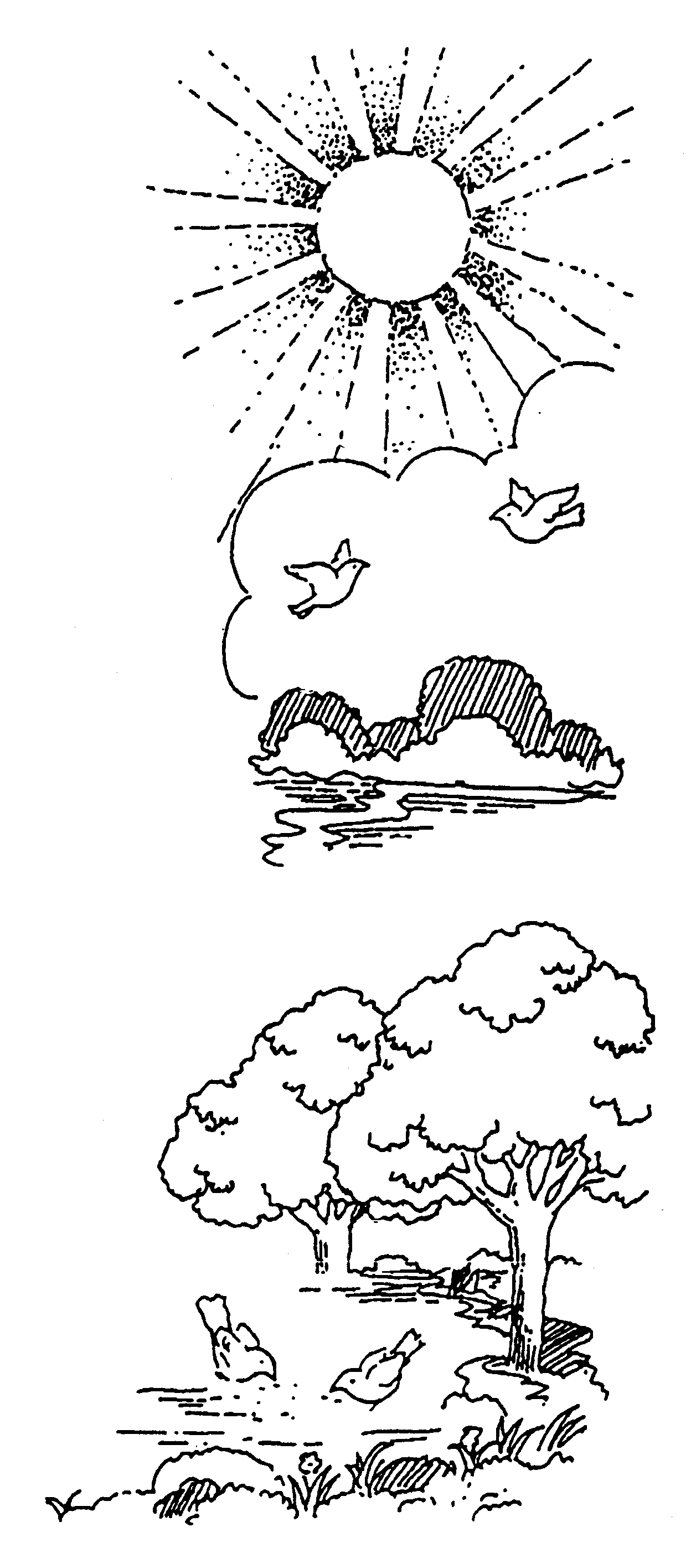
Time to get up, big sister sparrow!
All around it's getting bright
And still you got your eyes closed tight!
These golden messengers arrive
At the doorway of your nest
How can you still have sleep-filled eyes?
These other birds are out and about
Singing their sweet songs unceasing
And every where, see, they're pecking grain!
And here, while you are sleeping still,
Who's to fetch the food and water
To feed this tiny baby of yours?
And the moment her baby's name is said
Big sister sparrow is wide awake
And flying off with a whirr of wings!
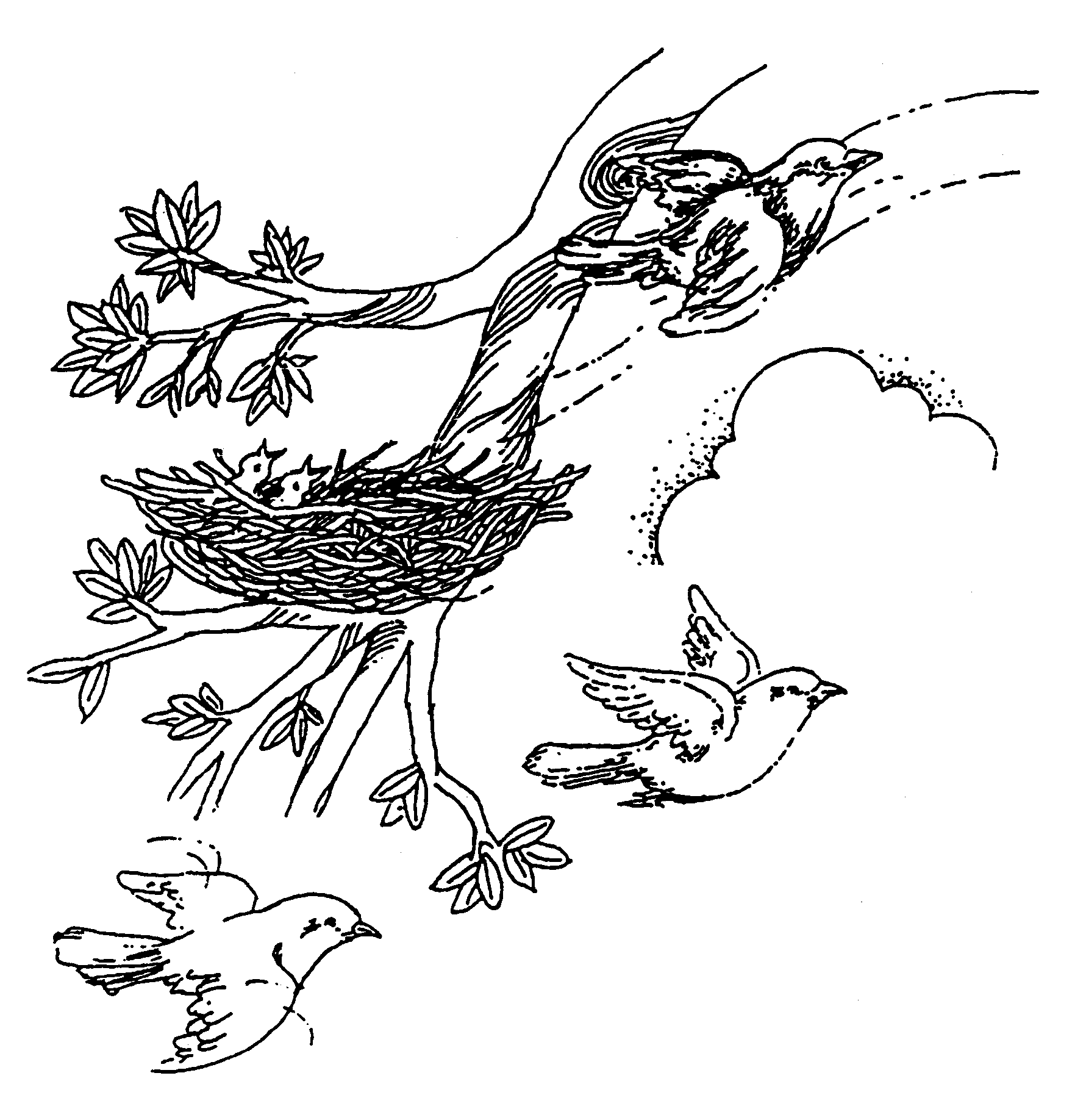
Unit Four
Stories
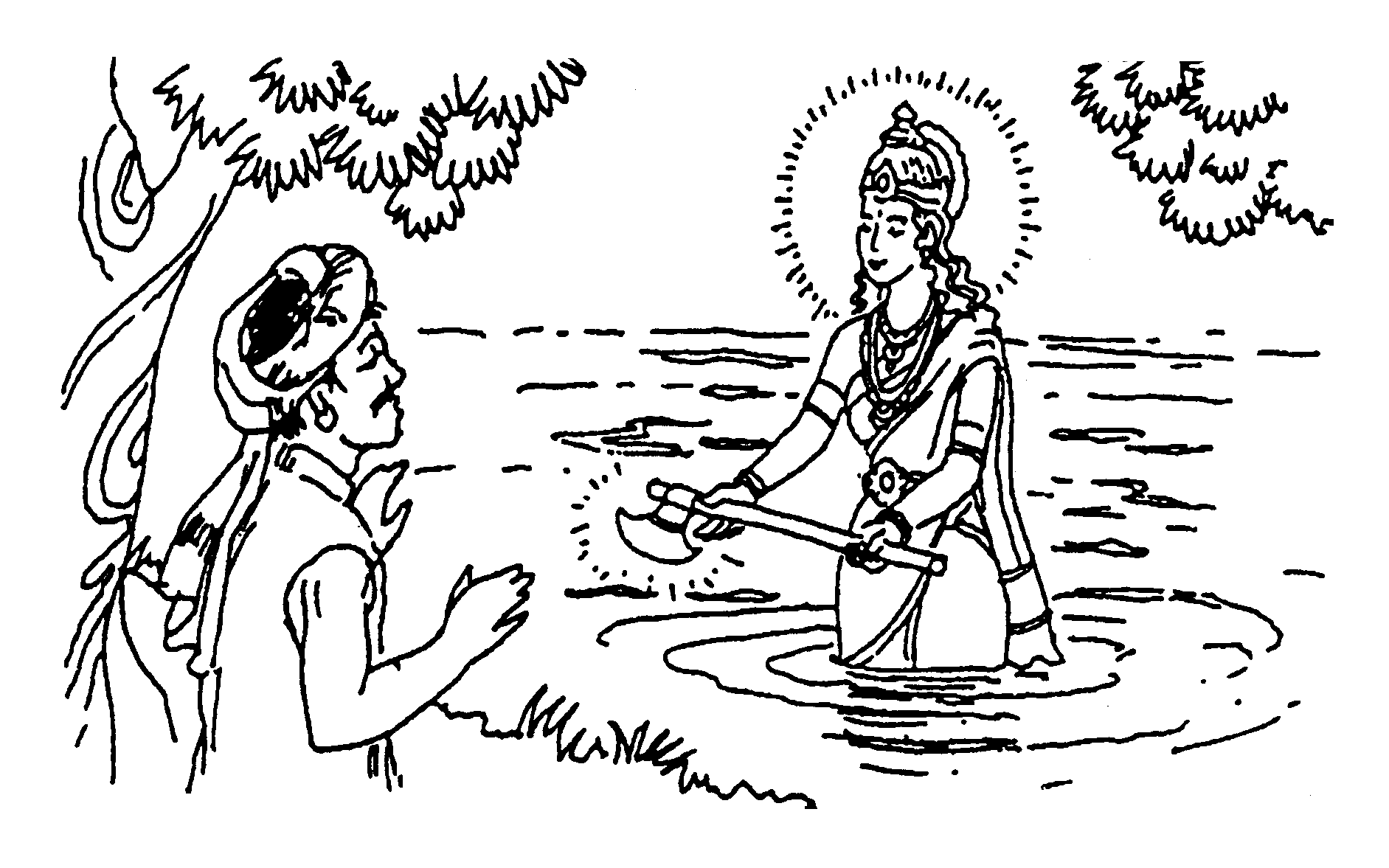
Once there was a woodcutter. His name was Kisan. Kisan's work was to cut wood. Everyday he would go to the jungle and cut wood. He would take the wood on his head and return to town. There he would sell the wood and earn money. He would work a lot, but he wouldn't get much money. Kisan was poor but hard-working and honest.
Once he was cutting wood on the shore of a lake - when his ax fell into the lake. Wood- cutter Kisan felt very bad. He prayed to the Goddess. In a little while the Goddess came up from the water. In her hand was a golden ax. The Goddess asked, 'It this yours?' He replied, "It isn't mine". Then the Goddess went back into the water and came back up again. In her hand this time was a silver ax. She said, 'Is this your ax?' He replied, 'This ax is also not mine'. Then the Goddess drew up an iron ax from the water. She said, 'It this ax yours?' He said, 'Yes, that is my ax'. Seeing this Goddess was very happy. She said, 'You're hard-working. You do a lot of work. You're honest. You don't tell lies ('speak falsely'). So I'll you this golden ax and this silver ax as a reward'.
The wood cutter was also very happy. He took all the axes and returned home.
VOCABULARY
Nouns
Adjectives and Adverbs
Verbs
Phrase
GRAMMAR
Past habitual.
The Past habitual in Marathi is used for habitual action in the past. Past habitual action can be expressed with three different verb forms in Marathi.
Paradigm 1:
This is the common written and literary form for expressing habitual action in the past. It uses the Past habitual forms of the verb
Verb
| | |
| | |
| | |
| | |
| | |
Paradigm 2:
There is yet another kind of largely literary Past habitual. However only two forms of this paradigm are in use : (1) first and third person singular and (2) third person plural. The rest of the forms of this paradigm (second person singular and the first and second person plural) are borrowed from either Paradigm 1 or Paradigm 3.
Verb
| | |
| | |
| | |
| | |
In this paradigm the rule for the -
Paradigm 3:
The Past habitual most frequently used in spoken Marathi is formed with the formative -
| Perfect | Past habitual |
| | |
| | |
| | |
| | |
| | |
| | |
| | |
| | |
| | |
| | |
| | |
A. Group activity.
A. Reconstruct the story taking the following questions into consideration.
B. In the text above the neuter singular is given with the formal
C. Group Activity.
Compare the use of the Past habitual in the first paragraph of the story with the use of the past tense following the adverb of time
D. Use paradigm 3 and whenever possible put the sentences from the story above in this pattern.
E. One by one around the class in a chain. Ask each other questions about your routine schedule before coming to India.
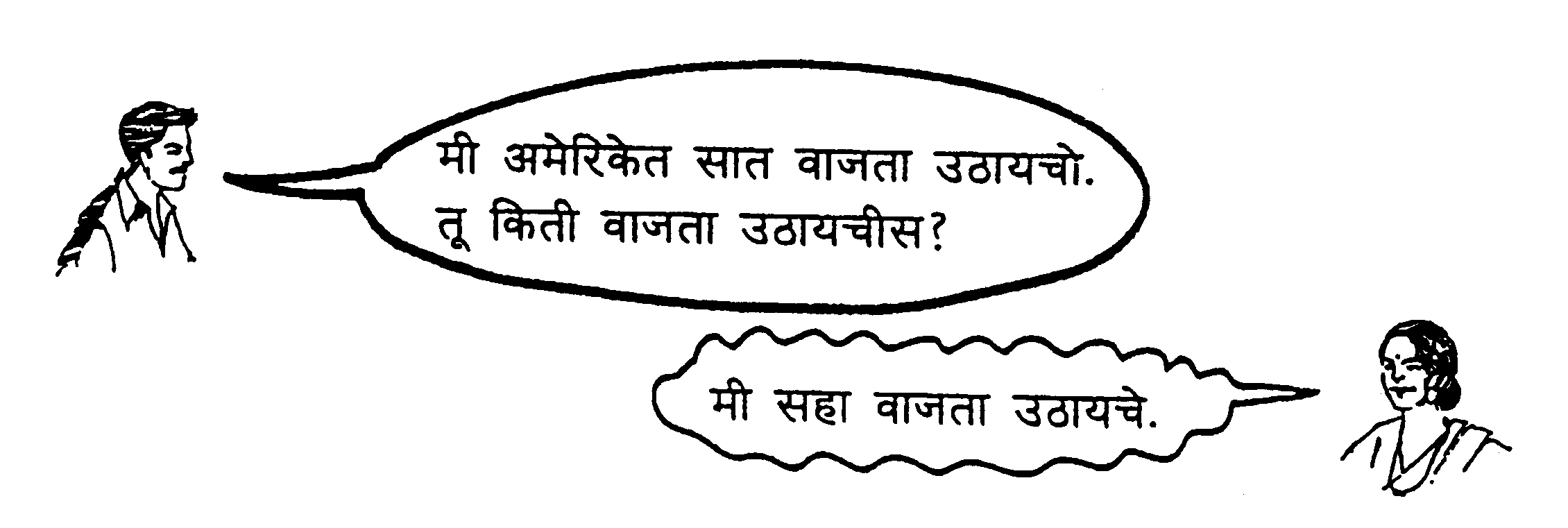 (
( F. State what you used to do as a child. Use Paradigm 3 forms starting with "
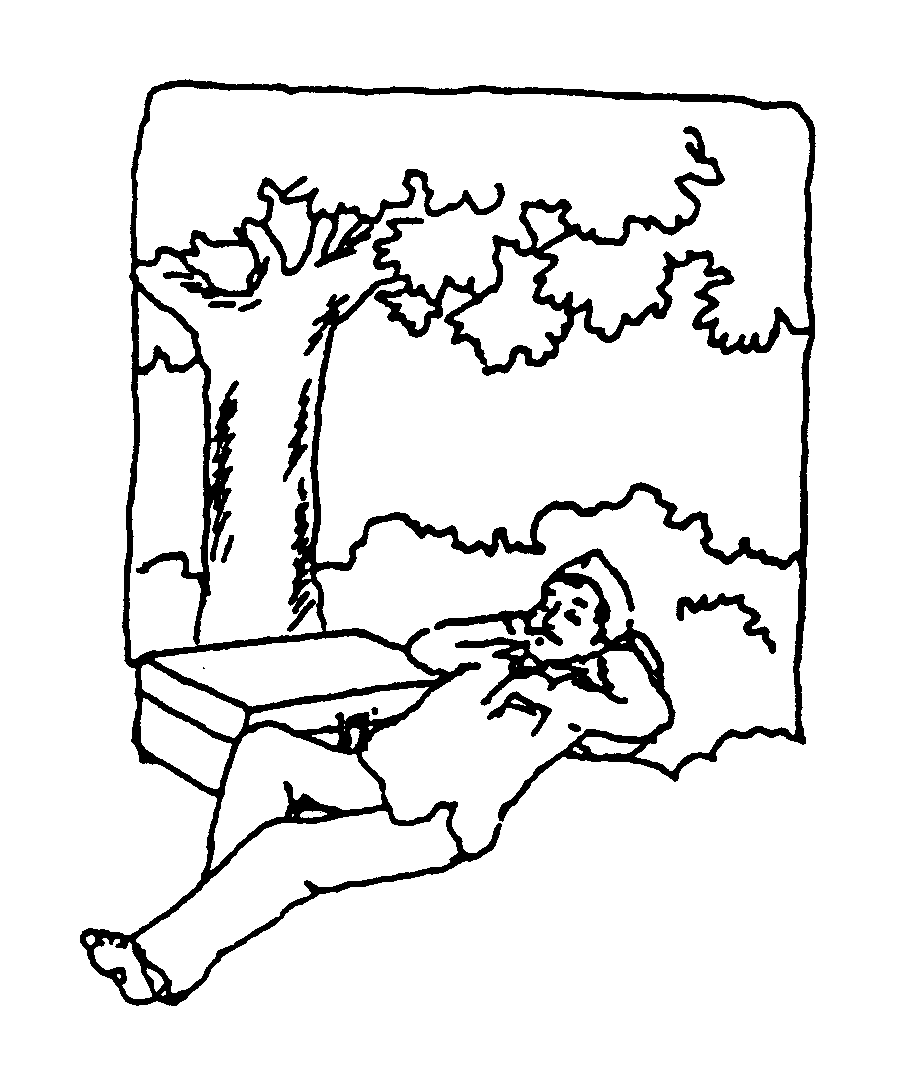
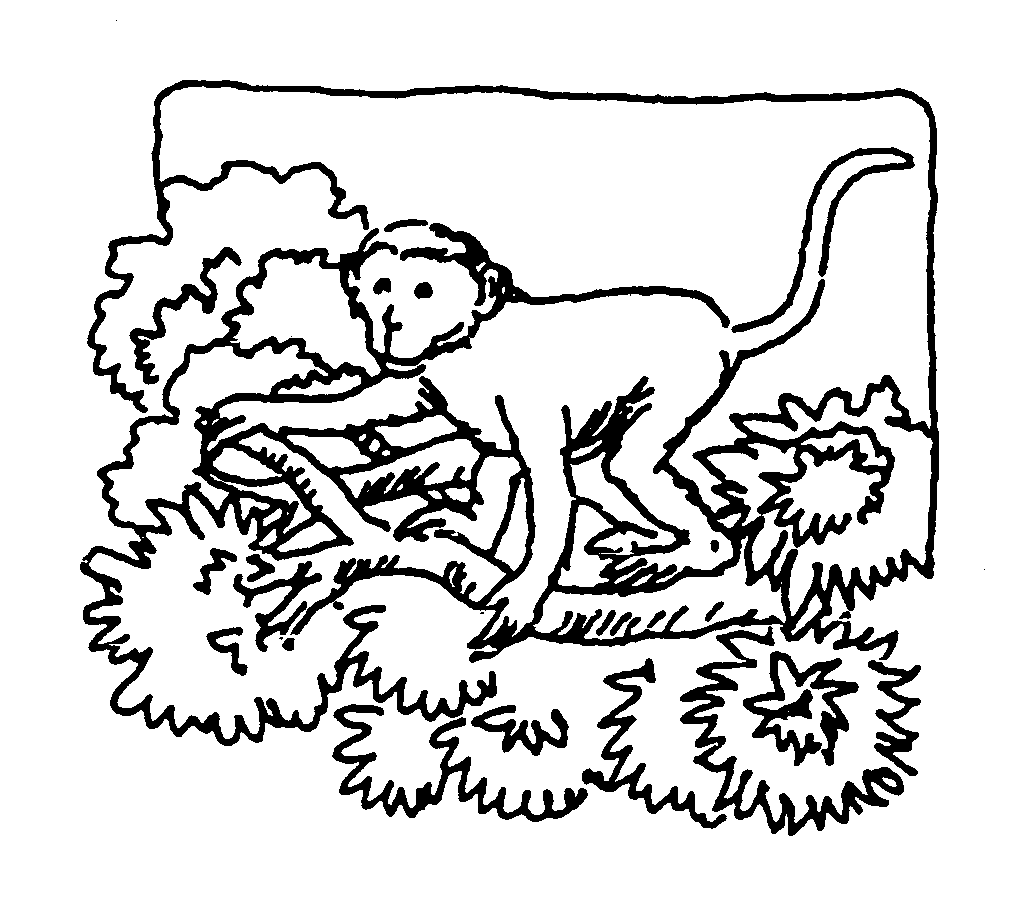
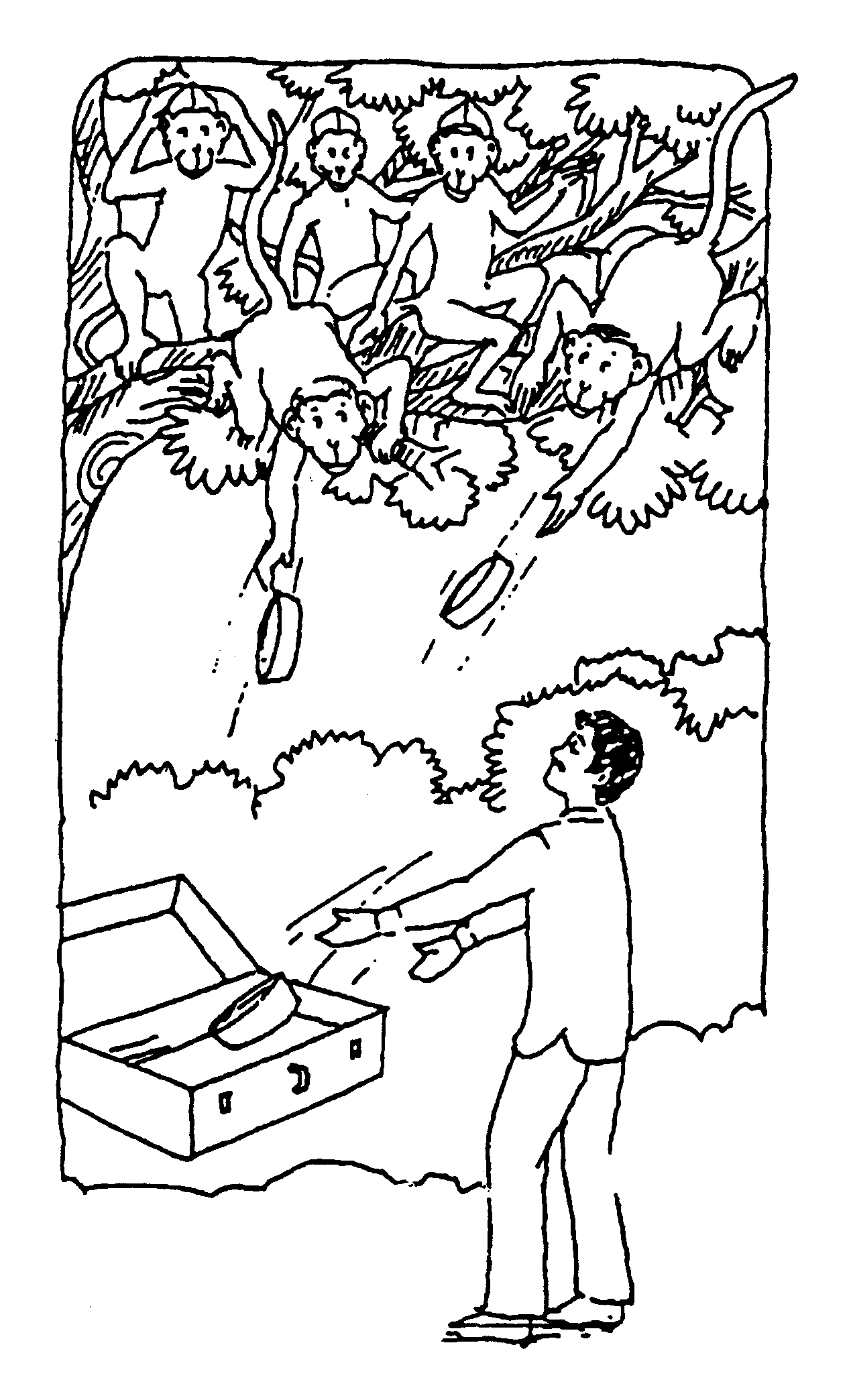 Once there was a cap vendor. His name was Sakharam. Sakharam had a lot of caps. He would keep those caps in a trunk. He would take the trunk on his head and would wander about from town to town. There he would sell the caps and would earn money and make a living ('fill his stomach').
Once there was a cap vendor. His name was Sakharam. Sakharam had a lot of caps. He would keep those caps in a trunk. He would take the trunk on his head and would wander about from town to town. There he would sell the caps and would earn money and make a living ('fill his stomach'). Once, after selling caps in one town, he was on his way to another town. The other town was very far. Along the way he came upon a jungle. His trunk was very heavy. Sakharam had gotten very tired. So he put the trunk under a tree. He too sat town under the tree. In a short while he fell asleep.
There were a lot of monkeys in that tree. One of the monkeys jumped down. He opened Sakharam's trunk and put a cap on his (own) head. Just the way Sakharam had put his on.
Seeing this, all the monkeys came down from the tree. Stealthily they went up to the trunk and each one put a cap on his head. Then they climbed up in the tree and started to make a whooping noise.
Sakharam woke up. There were very few caps left in his trunk. He looked up. All the monkeys had caps on their heads! Sakharam got mad and took a stick in his hand. The monkeys took branches of the tree in their hands. Sakharam threw a stone at them. They plucked fruit and threw them at Sakharam. Finally, tired and annoyed, Sakharam threw the cap from off his head in the trunk. Then the monkeys also doffed their caps and threw them down!
Sakharam gathered the caps together and put them in the trunk. He took the trunk on his head again and happily went on to the next town.
VOCABULARY
Nouns
Adjectives and Adverbs
Verbs :
Phrases
WORD STUDY
In the text above we have come across this verb with yet other aspects. 1. We read:
| | While going to Mumbai you come upon Lonavla along the way. |
| | Going to school you come upon a temple along the way. |
| | Turn left here and you'll come upon Meena's house. |
| | Five minutes from here you come upon a banyan tree. |
2. At another juncture we read
| | She was hungry. |
| | He was thirsty. |
GRAMMAR
The reflexive adjectives
In the text we read, in the sentence
This adjective can be used with all nouns and personal pronouns in the singular and in the plural.
| | Sarita told her own son. |
| | I saw it with my own eyes. |
| | He gave it with his own hands. |
Note that in the above context
The same examples can be repeated replacing
Note that
a. Use the forms of the past habitual from paradigm 2 in the beginning of the story above.
b. Group activity. Tell in Marathi how Cinderella used to suffer, cry, and work hard every day.
c. One by one around the class in a chain.
Answer the following questions adding

d. Replace
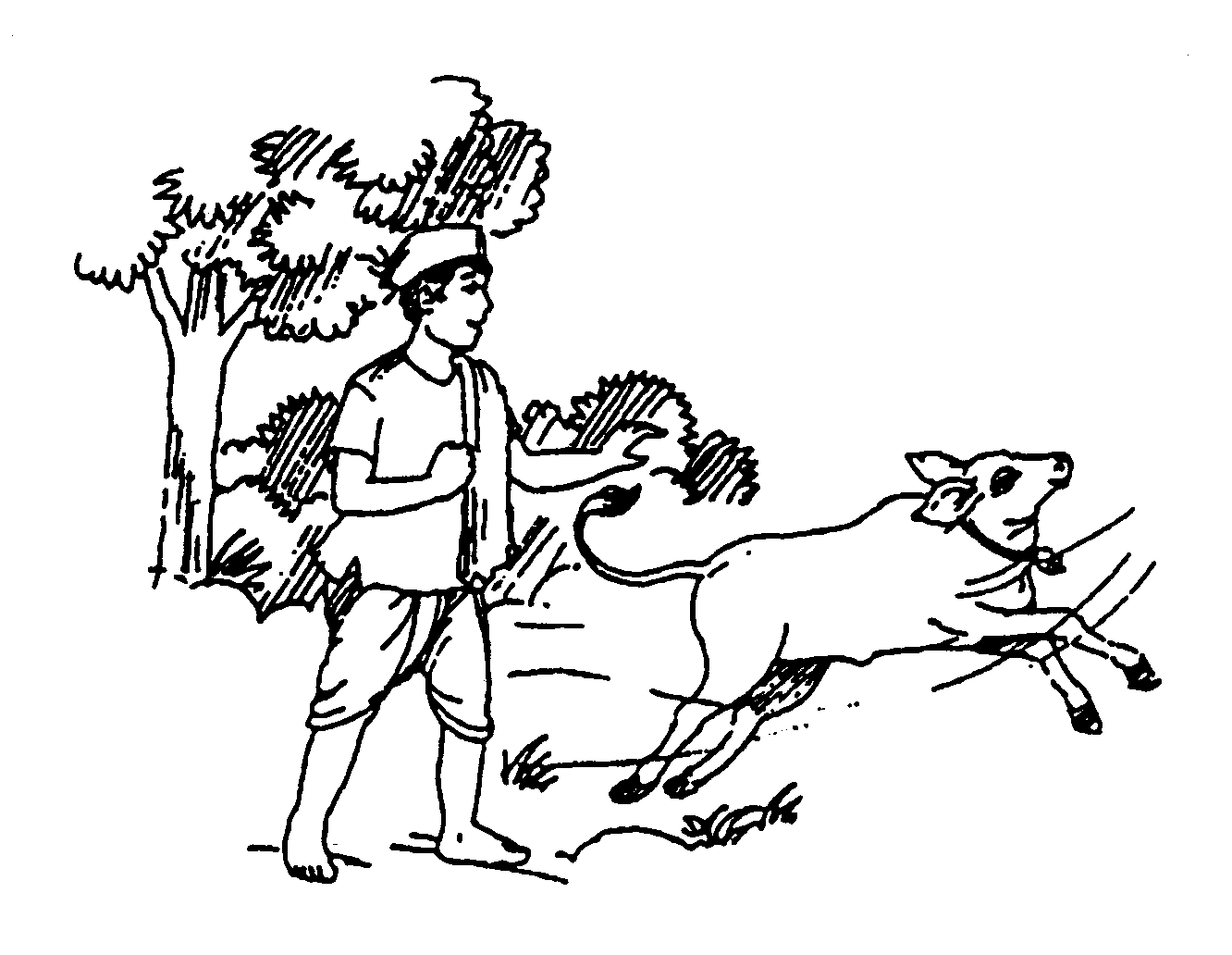
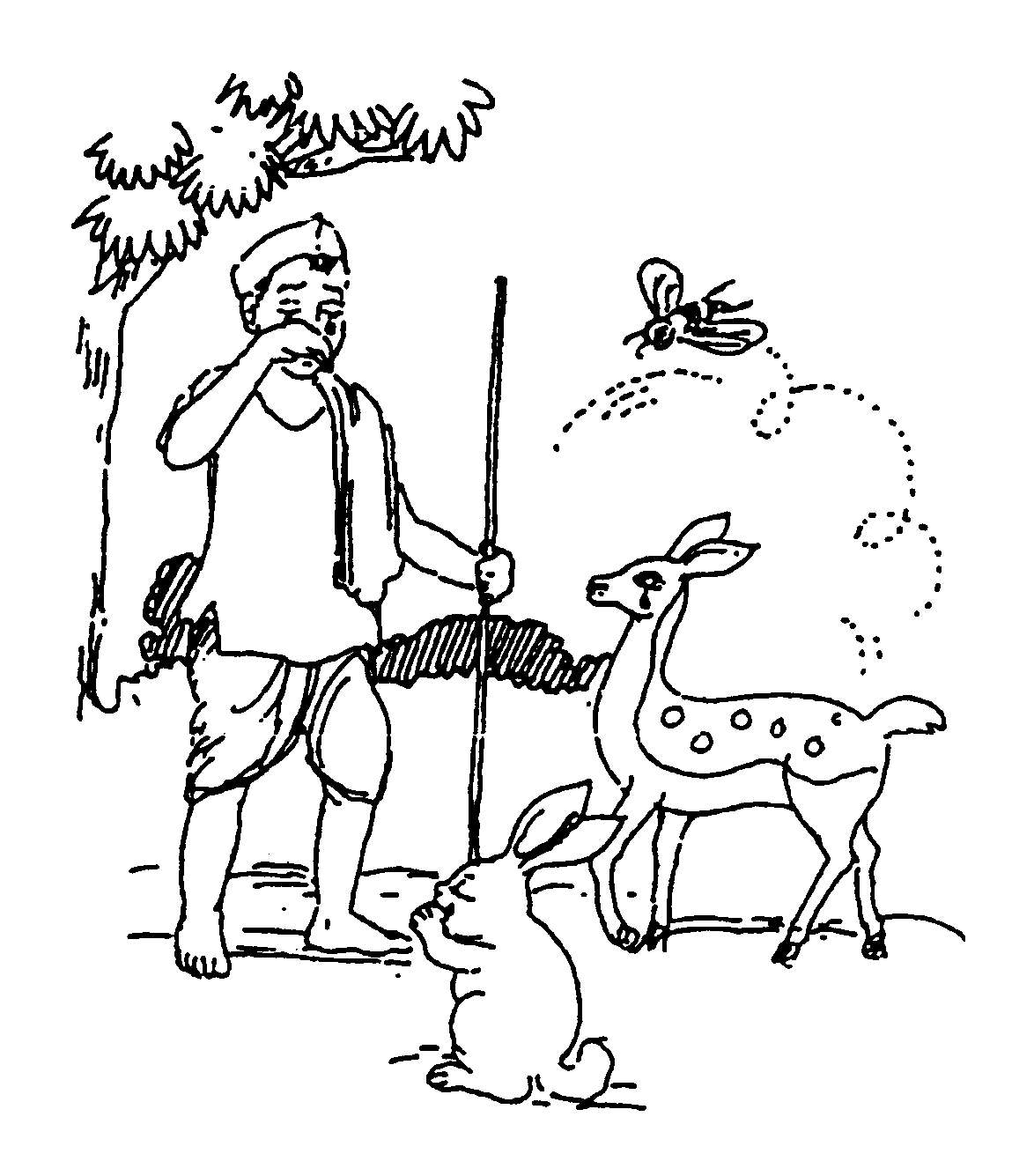
Once, there was a boy named Khandu. There was a small calf where he lived ('at his place'). Khandu would take it and go out to the forest every day. He would let the calf go and graze. The calf would be quite happy there. It would eat a lot, play, run and jump about. It was very cute looking but it was mighty stubborn.
Once all the cattle returned home. Evening came, but Khandu's calf wasn't ready to return home. Khandu finally stared to cry. Just then a rabbit came there. He asked, "Khandu, why do you cry?" "Because this stubborn calf won't come home".
The rabbit tried ('made an effort'), but the calf didn't listen to the rabbit either. Then the rabbit began to cry. A deer came by. He asked the rabbit, "Hey, rabbit, why do you cry?" "Because this calf won't come home". The calf didn't listen to the deer either. So then the deer also began to cry.
Then along came a wasp. She asked, "Deer, O deer, why do you cry?" The deer said, "Because this stubborn calf won't go home".
Then the wasp played a trick. She went up to the calf and stung ('bit') its ear hard. At which the calf ran jumping and bounding home. When he saw that Khandu was happy. He began to smile. Then the rabbit and the deer also began to smile. And the wasp went away making a buzzing noise.
VOCABULARY
Nouns
Adjective and Adverbs
Verbs
GRAMMAR
1. V-
| | But Khandu's calf wasn't ready to come home. |
2. N-
You already know the verb
| | Listen to me ('mine'). |
| | He listens to his daddy ('daddy's). |
a. Repeat the following sentences. Imagine the situational contexts in which one would use them.
b. Form some more sentences with V
c. Form a few sentences with -
d. Group activity.
Reconstruct the story
e. Repeat some sentences from this story using the formal ending
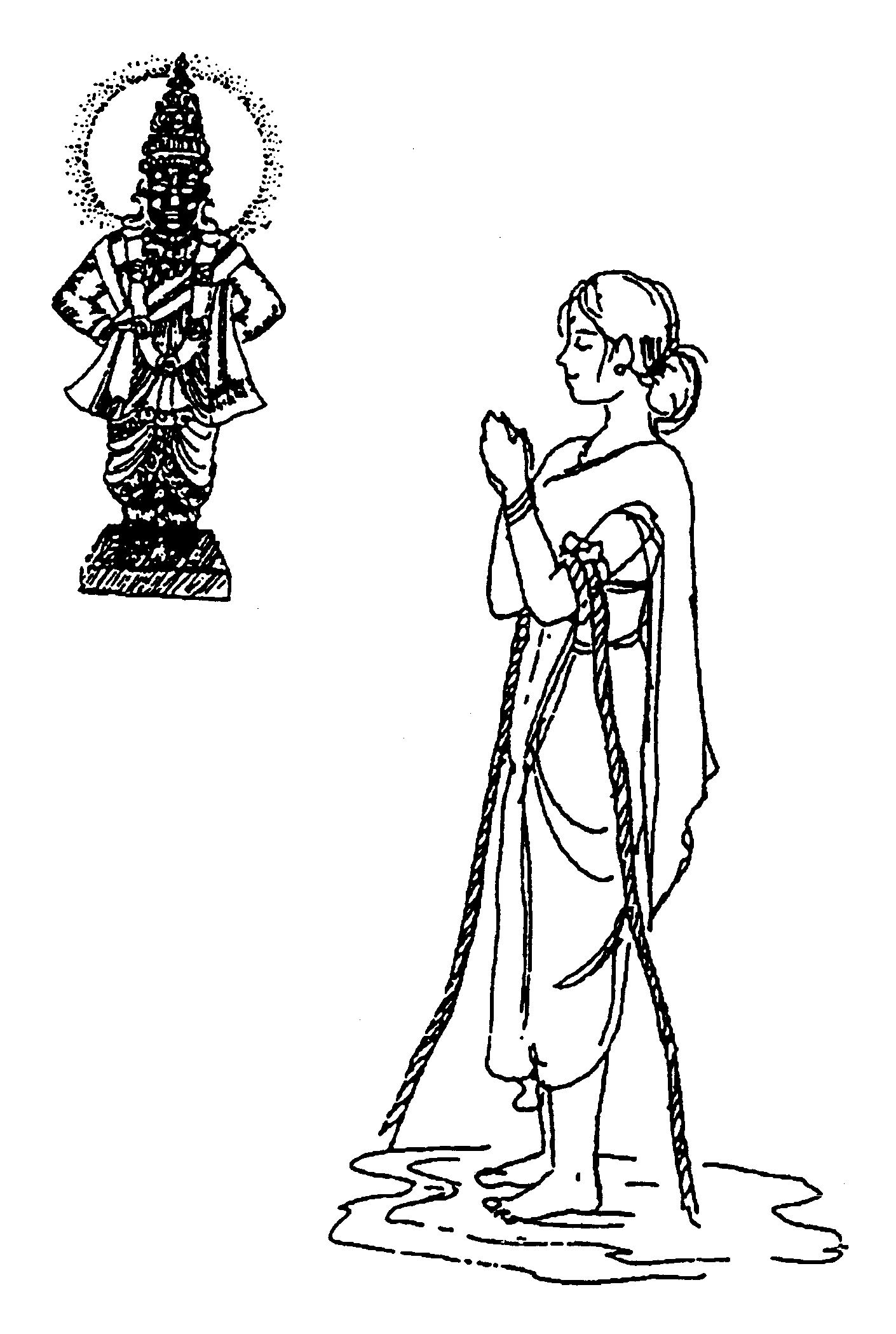
Vitthal himself left behind his necklace at the devotee Jani's place. But then Jani was accused of theft.
On the banks of the Chandrabhga river a stake was installed to execute Jani. Cuffs were put on her arms. She was take to the stake.
Jani pleaded to Pandurang, "It's a false suspicion, because I haven't stolen your necklace".
On this appeal Pandurang hurried to help and rescued her. The stake melted to water. Such were the great achievements of Jani. So gracious was Vitthal.
Unit Five
Social Aspects
-
*
-
*
-
*
-
*
-
*
 A Dialog
A Dialog - Hello. This is Susan the American student speaking. Is Mr. Mate there?
* Yes, this is Mate speaking.
- I need some information about your work.
* You mean about the institution called "The Shelter"?
- Yes. Correct. Will you give me information?
* Yes. Certainly I will. Please come once and visit "The Shelter".
- Yes. I will. When shall I come?
* Will you come Friday morning around ten?
- Yes. That's fine. I'll come on Friday. Thank you. Good-bye.
* Good-bye.
VOCABULARY
Nouns
Postpositions
-
-
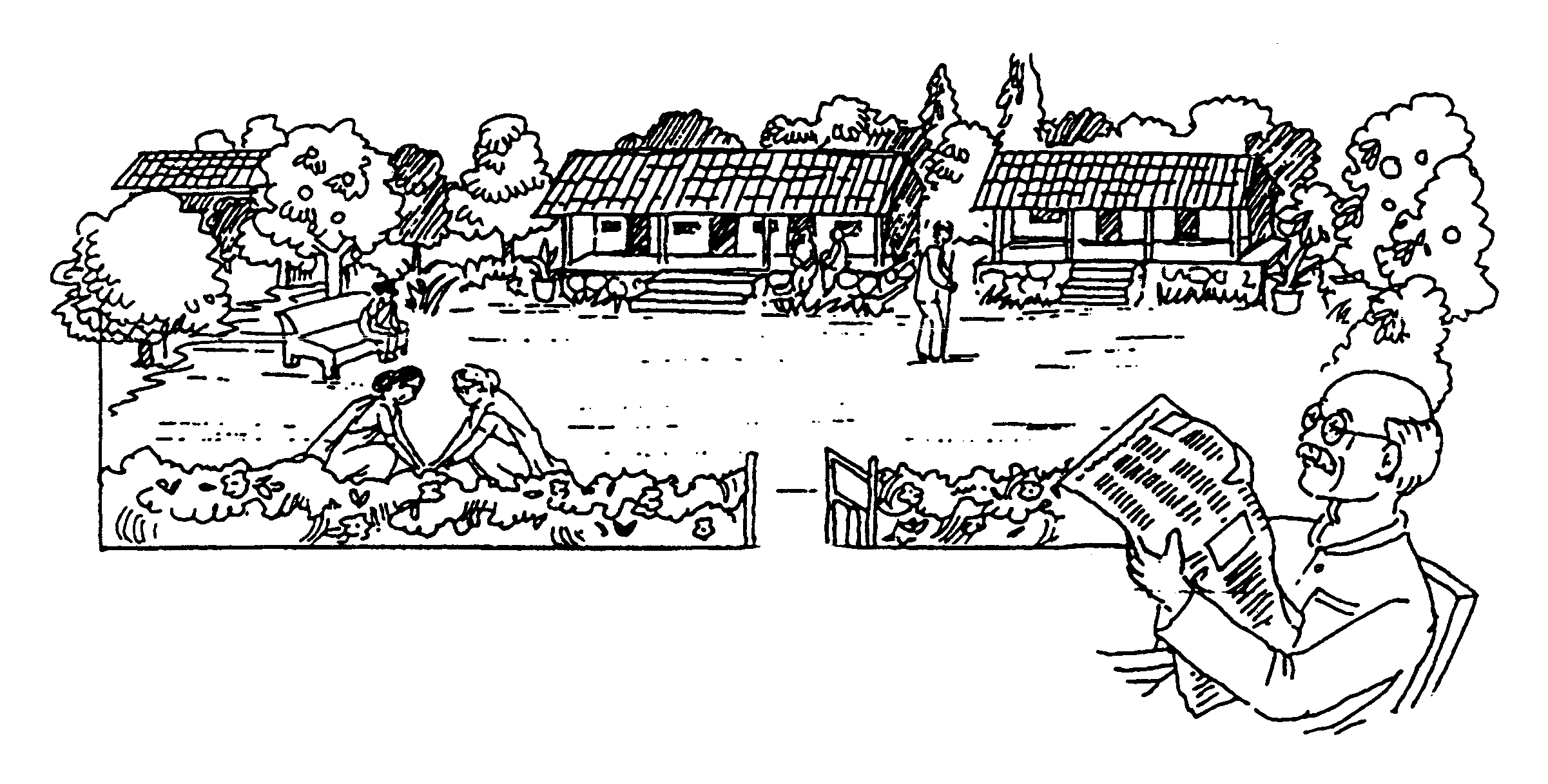 -
- *
-
*
-
*
-
*
-
*
-
*
-
*
-
*
-
*
-
*
- Hello, are you Mr. Mate?
* Yes, and you're Susan? Did you have trouble finding the address?
- No. I got here just fine by rickshaw. These premises are very nice.
* Yes. We've made efforts that way. I've been (I'm) working here the past twenty years.
- People live here in "The Shelter", don't they?
* Yes. "The Shelter" is a retirement home. At present there are eighty-five elderly people living here. Only four people work on salary.
- So few?
* The people here also help in the daily work. Moreover, some volunteers work here. They don't take money.
- How does the institution get money?
* We have made this institution self-supporting now. We've planted a lot of trees here. We're selling fruit, vegetables and saplings. We're earning money from that.
- That's why these premises are looking so green and nice.
* That's right. We've also built a large hall. We're earning money from that. Kids play table tennis in this hall everyday.
- It's really very nice that kids come here everyday.
* Right. This too is our purpose. People also make donations to the institution.
- What are the distinguishing features of your institution?
* People of every religion and caste are living here. These people have no money. They have no close relatives. They are needy. That's why they are living here. We do not take any money from them. They are living here for free.
- Wow! This institution is doing some really good work.
* Elderly people live here. But children, volunteers, donors and other people too come here from outside. That's why the people here keep a connection with the world. This is important.
- That's true. This is very important.
* Come along, let's wander about and see the ashram.
- Yes, let's see it.
VOCABULARY
Nouns
Adjective and Adverbs
Verbs
WORD STUDY
A corresponding traditional feminine form to
GRAMMAR
Contracted forms of verbs, in review.
In spoken Marathi as we have seen, the verb constructions that use the auxiliary
The Imperfect form of the verb
Verb
The underlying forms of these contractions are the Imperfect paradigm + auxiliary. It should be remembered in this case however that the underlying forms are theoretical only and not used in speech or in writing.
| Sg. | Pl. |
| | |
| | |
| | |
| | |
| | |
| | |
| | |
Verb
In this case the underlying forms are in fact used in more formal styles of speaking and in writing.
| Sg. | Pl. |
| | |
| | |
| | |
| | |
| | |
| | |
| | |
As for transitive verbs, in the Imperfect they work exactly the same way as intransitive verbs, e.g.
| Sg. | ||
| | I've made a fort. | |
| | I've made a chapatti. | |
| | I've made a pakora. |
| Pl. | ||
| | I've made forts. | |
| | I've made chapattis. | |
| | I've made pakoras. |
However,
| Sg. | |
| | |
| | |
| |
| Pl. | |
| | |
| | |
| |
Unexpected anomalies like this should prove to you (if you still need the proof) that Marathi is a language spoken by real humans, not robots.
a. In pairs.
In practicing
b. Group activity.
Discuss the old peoples' home described above. Everyone should contribute at least one sentence.
c Discuss old peoples' homes in America.
d. One by one around the class in a chain.
Fill in the verbs where necessary and carry out a short conversation using contracted forms.

e. One by one around the class in a chain.
Answer the following questions by using contracted forms :
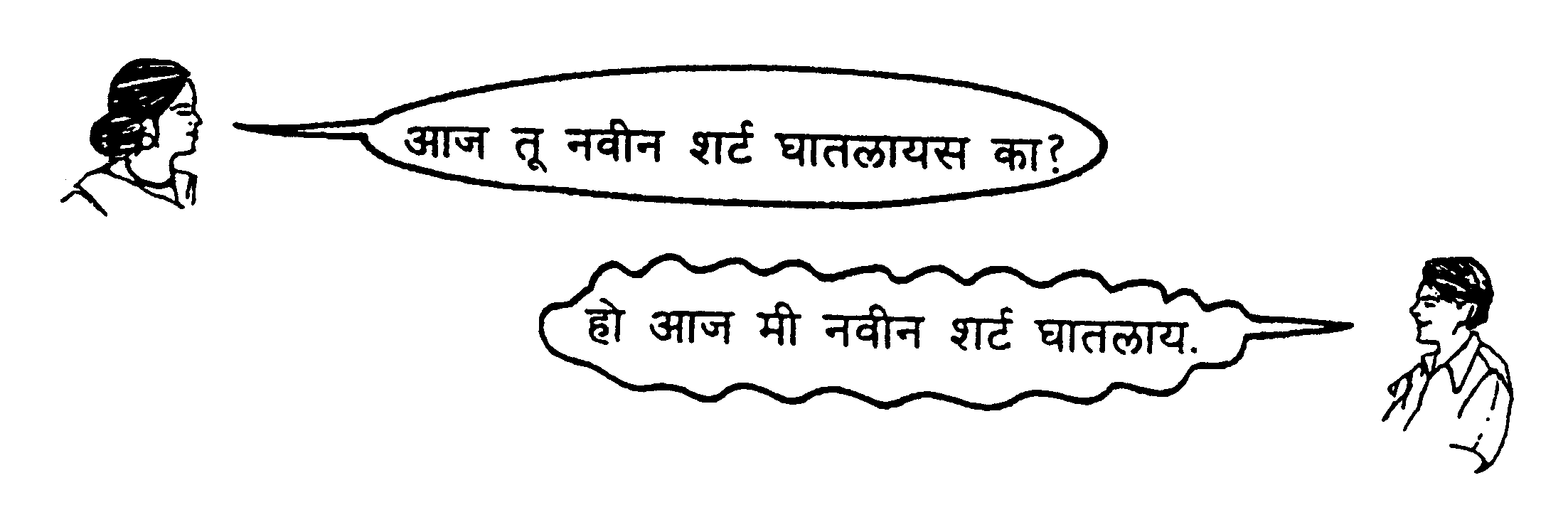
17.
| | The Bhosle's American Son |
| - | Has an American boy come to the Bhosle's? |
| * | Yes. That's John. It's been one month he's been living in the Bhosle family. |
| - | I see. What's he doing here? |
| * | He's learning Marathi. He's the same age as the Bhosle's own Sandeep. He's come all alone. And he's living so nicely in their family. |
| - | The Bholses have two kids, don't they? |
| * | Yes. Sandeep is the older. He's doing his B. Sc. His younger sister is Sonali. She's appearing for her twelfth standard exam. |
| - | And now this Jon. Which mean the Bhosles have three kids at present. |
| * | Yes. That's true. Sonali has two brothers at present. |
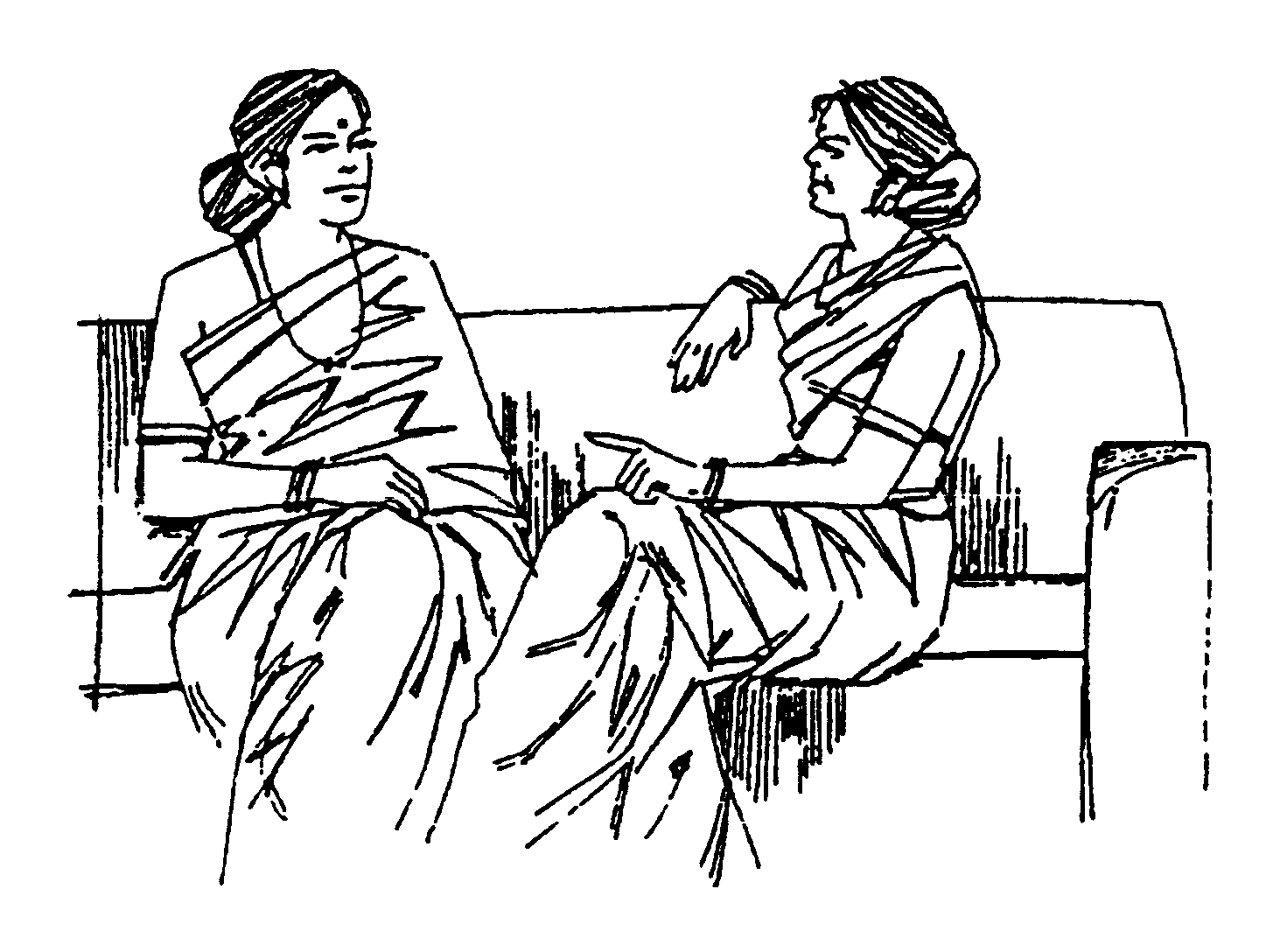
VOCABULARY
Nouns
to become acquainted
Adjectives and Adverbs
Postposition
Interjections
Verbs.
WORD STUDY
| | Shankar's Family |
| - | - Shankar, does your wife stay at home or does she go to work? |
| * | * She goes to work. She does the cleaning and washing in four homes in this neighboring building. |
| - | - Is your father still working? |
| * | * He isn't working now. He was a peon in a company, which is way I also got the peon's position. |
| - | - And what about your brother? |
| * | * Oh yeah, he's in the S. T. He's a conductor. And the other's back in the village. |
| - | - What does he do? |
| * | * There's a bit of farming. But with one uncle and three cousins, we don't get anything at all. So he works as a mason too. |
| - | - What does your sister do? |
| * | * She also lives in the village. She married that shoemaker's son. Ever since the marriage we've broken off relations. She has three kids - so I have two sororal nephews and one sororal niece. But I've never seen them yet. |
| - | - So how many grandchildren does your mother have? |
| * | * With my two, my brothers' two, the three belonging to my brother in the village, and my sister's altogether ten. |
| - | - Together your two brothers have four boys and one girl. Which means you must have four fraternal nephews and one fraternal niece altogether. |
| * | * Yes, they all call me Shankar Kaka. They all go to school. |
| - | - That's good thing, thank goodness. Make sure they all finish school. |
| * | * Yes, Tai. OK then, I'll be off. |
| - | - Yes. See you. |
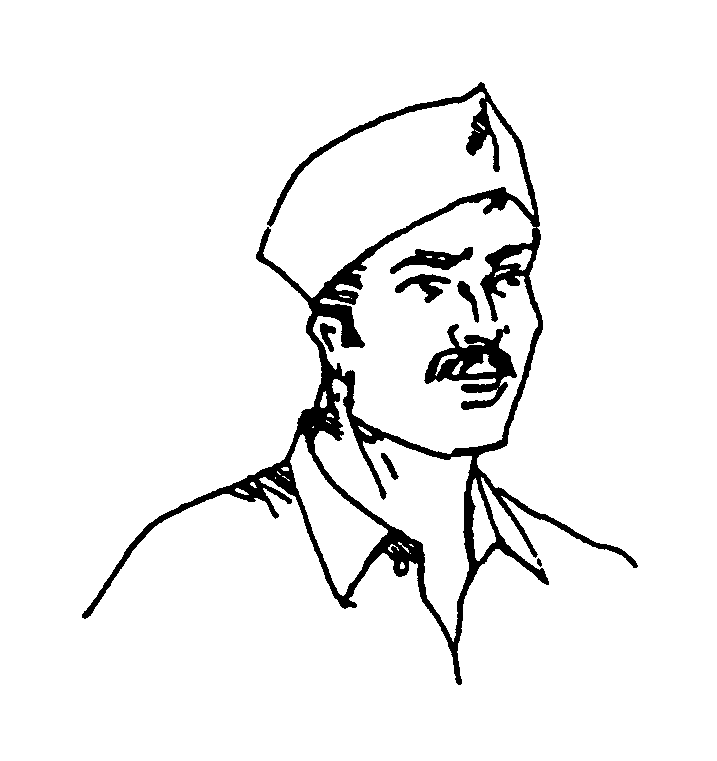
VOCABULARY
Nouns
Adjectives and Adverbs
Conjunction
Verbs
Phrases
WORD STUDY
a. Read the text '
b. In pairs.
Introduce your extended family with your uncles and aunts and their children. Tell in Marathi how are they related to you.
c. Take the chart
d. One by one around the class in a chain.
Answer the following questions.
1.

2.
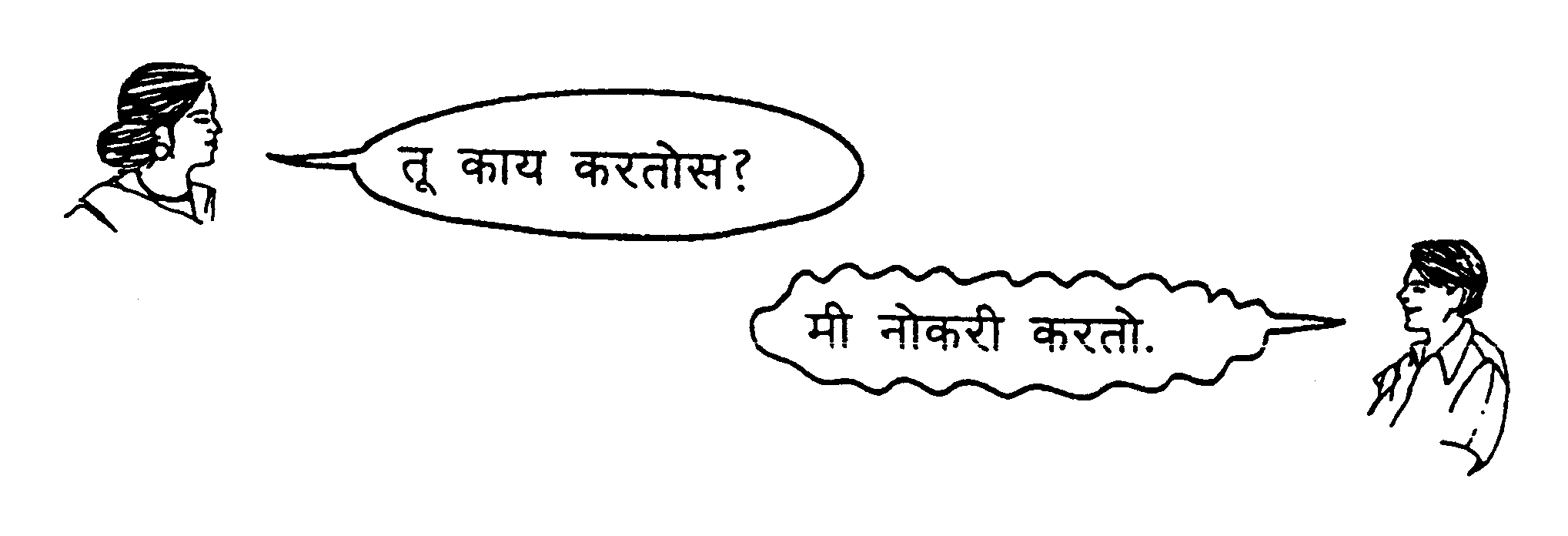
3.

4.

I. Put the adverbs given below in gradation from low to high.
Do you know this?
| | |
| | |
| | |
| | |
| | |
From the perspective of
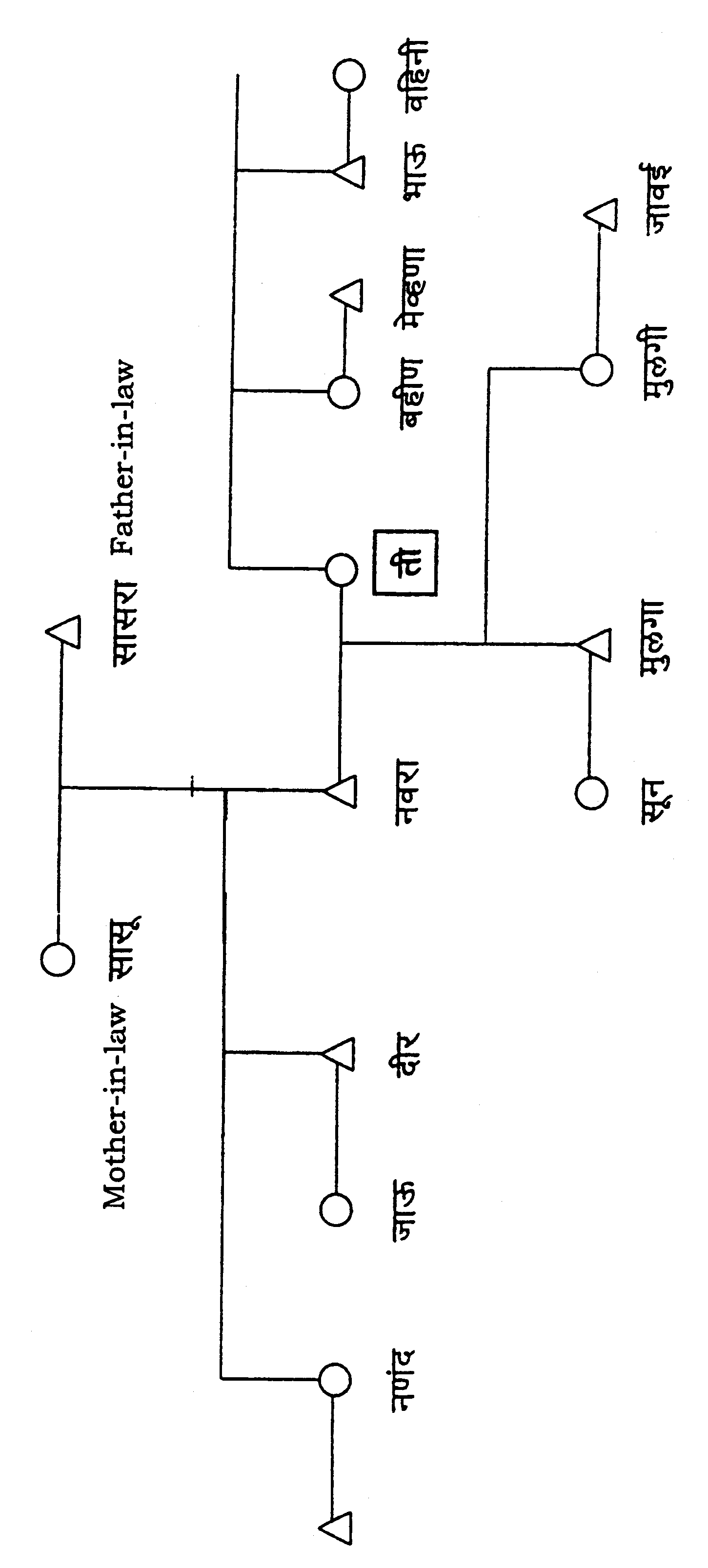
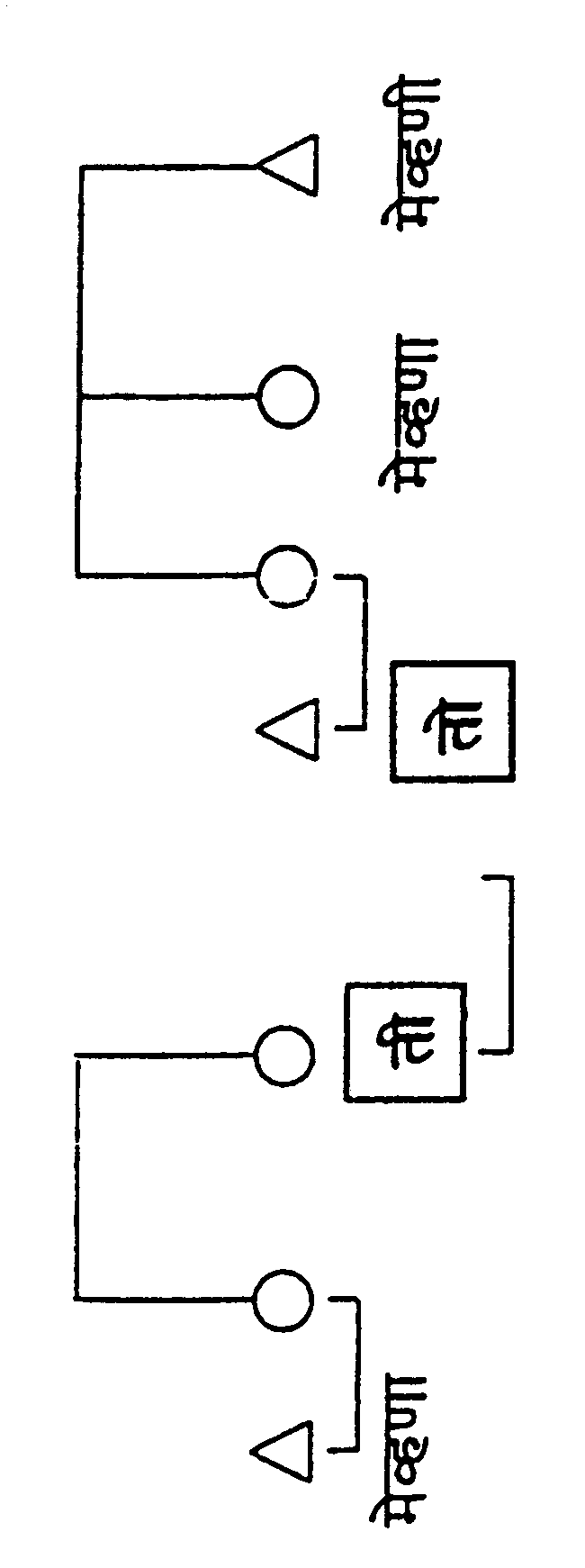
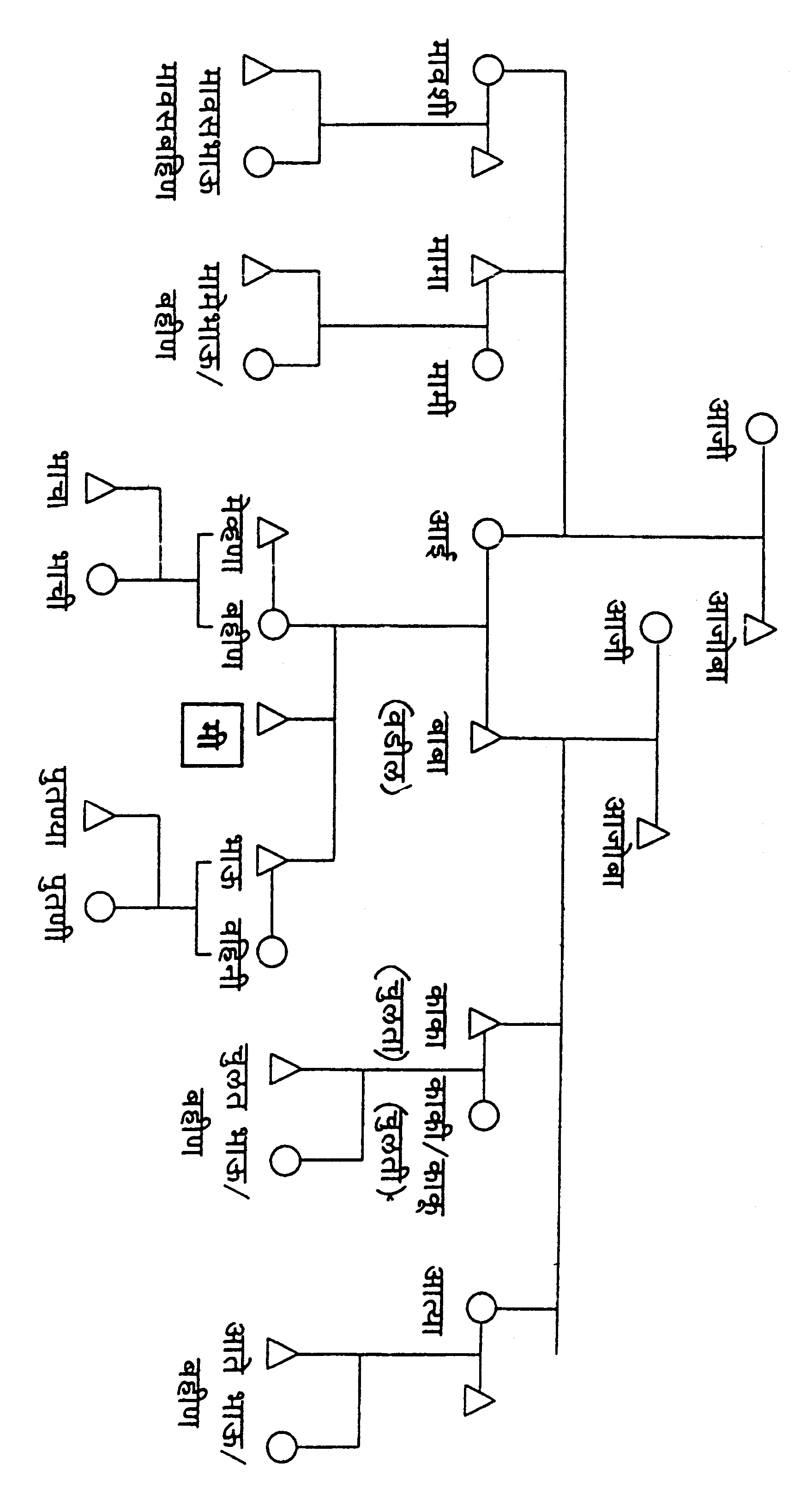 mother's and father's perspective
mother's and father's perspective
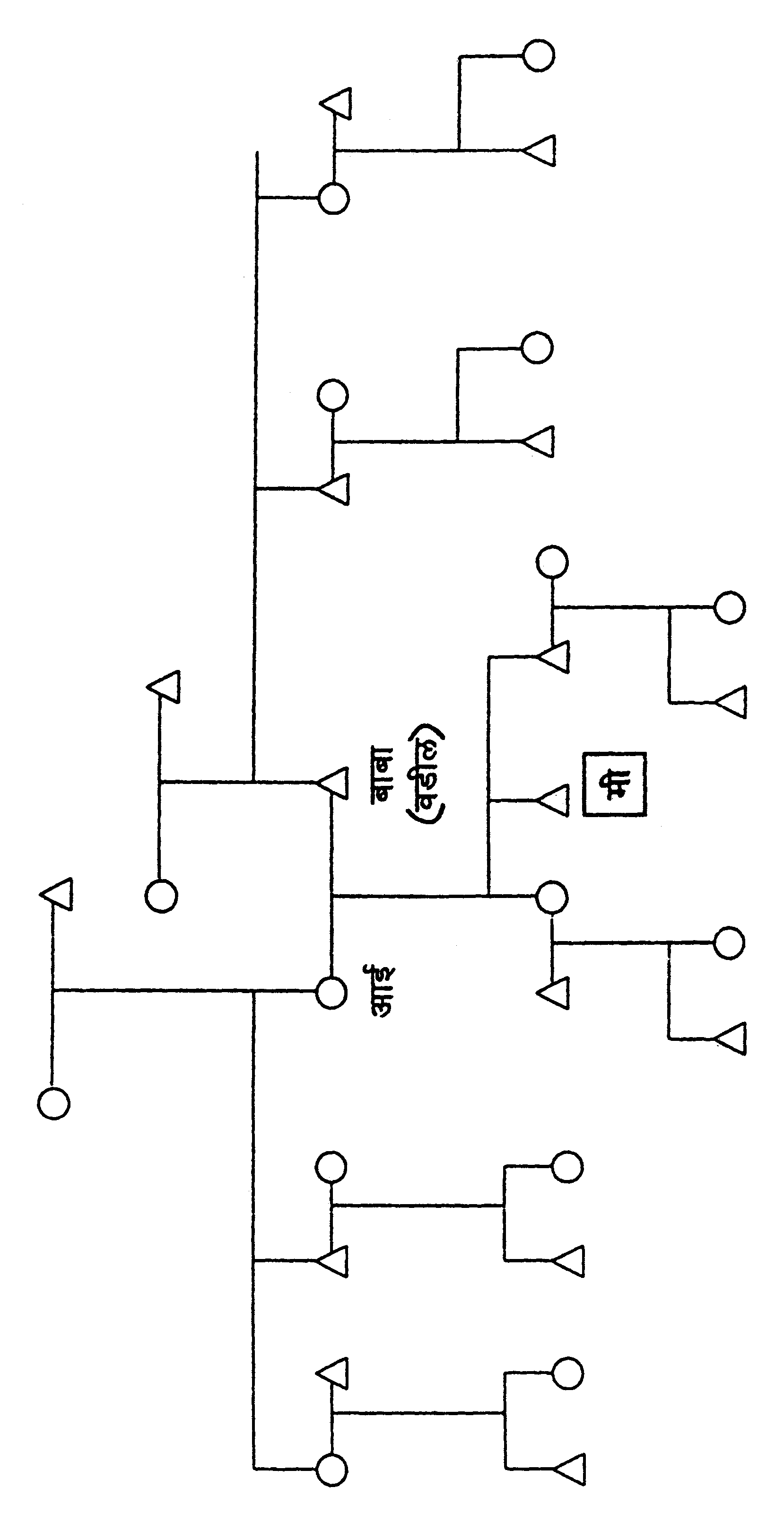
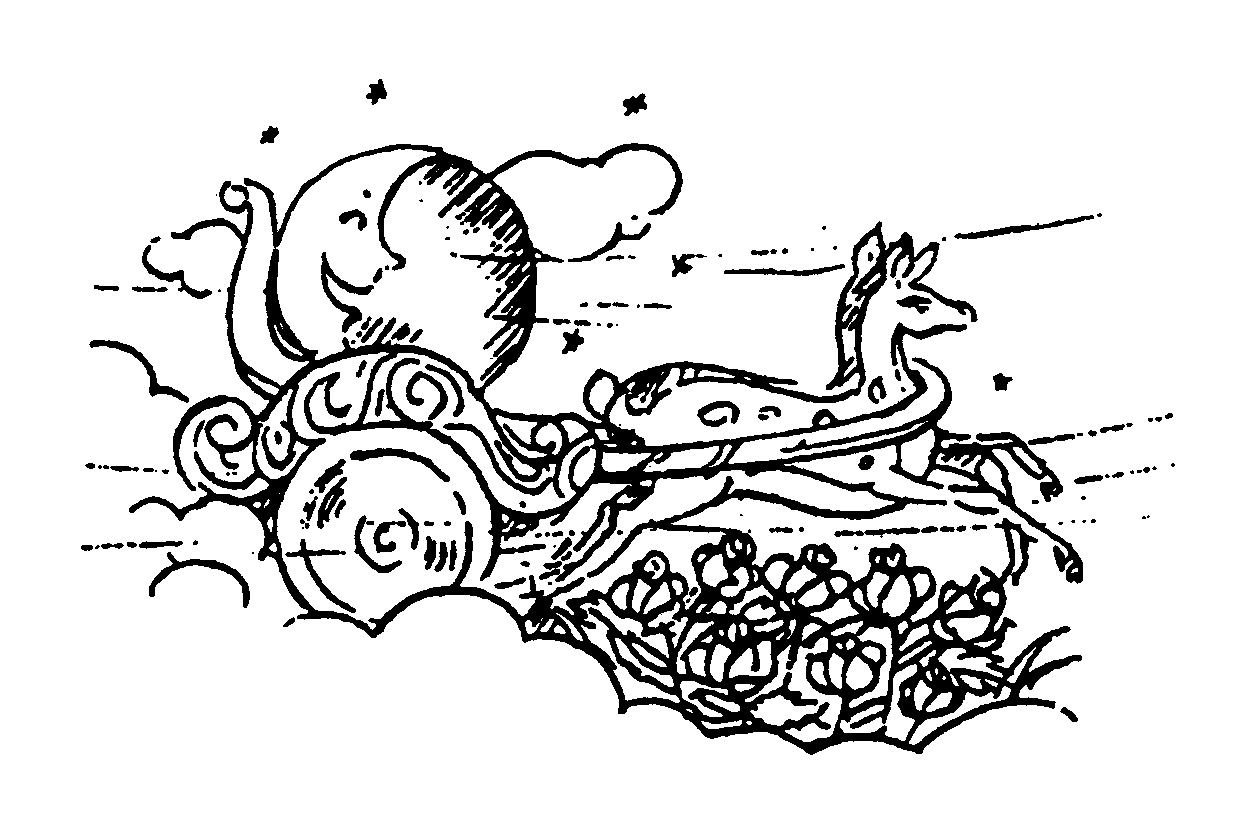 Such a fair lady, such a fair lady, as beautiful as a flower, Dada, my elder brother, bring me a so lovely vahini, my sister-in-law
Such a fair lady, such a fair lady, as beautiful as a flower, Dada, my elder brother, bring me a so lovely vahini, my sister-in-law To bring her home we'll have a moon chariot pulled by a pair of deer skipping through a garden of roses.
For her to wear a sari pitch dark as a new moon night speckled with stars, a pallav full of stars, bordered by a streak of lightning.
Once we become friends you will get a whack on your back and she'll get a little peck on her cheek. Then both of us will become sweet little dolls.
Unit Six
Great Personalities
-
*
-
*
-
*
-
*
-
*
-
*
-
*
-
*
-
*
-
*
-
*
-
*
-
*
-
*
-

- Rekha Tai, you become a doctor. Do a lot of Indian women become doctors the same as you?
* Yes, Sarah, a lot of women become doctors now. Do you know who the first Marathi woman was who became a doctor?
- No, what was her name?
* Her name was Anandibai Joshi.
- When did she become a doctor?
* In the nineteenth century. Anandibai was born in the year 1865. Girls weren't being educated ('weren't learning') then.
- Why was that?
* People used to say then about girls, 'Once educated, forever spoiled.'
- Then how did Anandibai get educated?
* Her father taught her to write and read. But she got married in only her ninth or tenth year.
- And then?
* Her husband's name was Gopalrao Joshi. Gopalrao knew the great importance of education. He was bound and determined and Anandibai was smart. Gopalrao decided he'd make Ananadibai a doctor.
- Did Anandibai do a lot of studying?
* Yes. She studied a lot. But she had a lot of hardship.
- Really?
* Yes. In just a few years after getting married she learned English. She finished her schooling.
- And then?
* Then in April 1883 she went by boat from Calcutta to America.
- Alone?
* Yes. All alone. And in three years there, in March 1886, she earned her M. D. Degree.
- My gosh! That's really something!
* She was very bright. At that time it was very difficult for women to be educated. But even so she became a doctor then. This is the remarkable thing.
- I really am surprised ('feel surprise').
* But this journey put her under a lot of stress. She returned to India in October 1886. A few months after that, in February 1887, she passed away - that is, she died.
- Oh my goodness! She lived only a very few years.
* Yes. Her life was short. But today even after a hundred years we remember her. There's a fine novel about her called Anandi-Gopal. You should read it.
- What? I should read a Marathi novel?
* Well see, there's play too called Anandi Gopal that's based on the novel. You must see it.
- Yes. I will definitely see this play.
VOCABULARY
Nouns
Adjective and Adverbs
Conjunction
Interjection
Verbs
Phrases
WORD STUDY
1.
2.
| | We fixed / finalized the date. |
| | The date was set. |
| | She arranged her marriage. |
| | Her marriage has been arranged. |
| | Gopalrao decided he'd make Anandibai a doctor. |
| You could also say, for instance, | |
| | We decided we'd go to Mumbai during Diwali. |
3.
| | She earns a degree. |
| | The degree is earned by her. |
4. Although
GRAMMAR
The verb
Verb
| | She became a doctor. |
| | He became rich. |
This verb is used in the imperfect as in examples below.
| | A lot of accidents happen on this road. |
| | Smart kids become engineers or doctors. |
| | A lot of weddings take place in May. |
Note that the Imperfect of
| Imperfect | Past tense of Aux. | ||
| | | | |
| | | | |
| | | | |
| | | | |
| | | | |
Perfect
| | |
| | |
| | |
| | |
| | |
a. In Pairs.
Practice conversation with the verb
| | |
| | (I am becoming an engineer.) |
| | |
| | |
| | |
| | (I am done. My tummy is full.) |
| | |
| | (Not yet.) |
| | |
| | (Yes. It took place last year.) |
| | |
| | (No. I am still at it. It is going on.) |
| | |
| | (I have finished. I am ready.) |
b. Put the following sentences in the perfect.
c. Discuss the last sentence of exercise (c) and find out its different meanings.
d. Discuss the use of the verbs in the following two examples:
e. Put the following sentences into the past tense and compare them with the sentences given under (c).
f. Find spoken forms in the third person neuter singular in the dialog
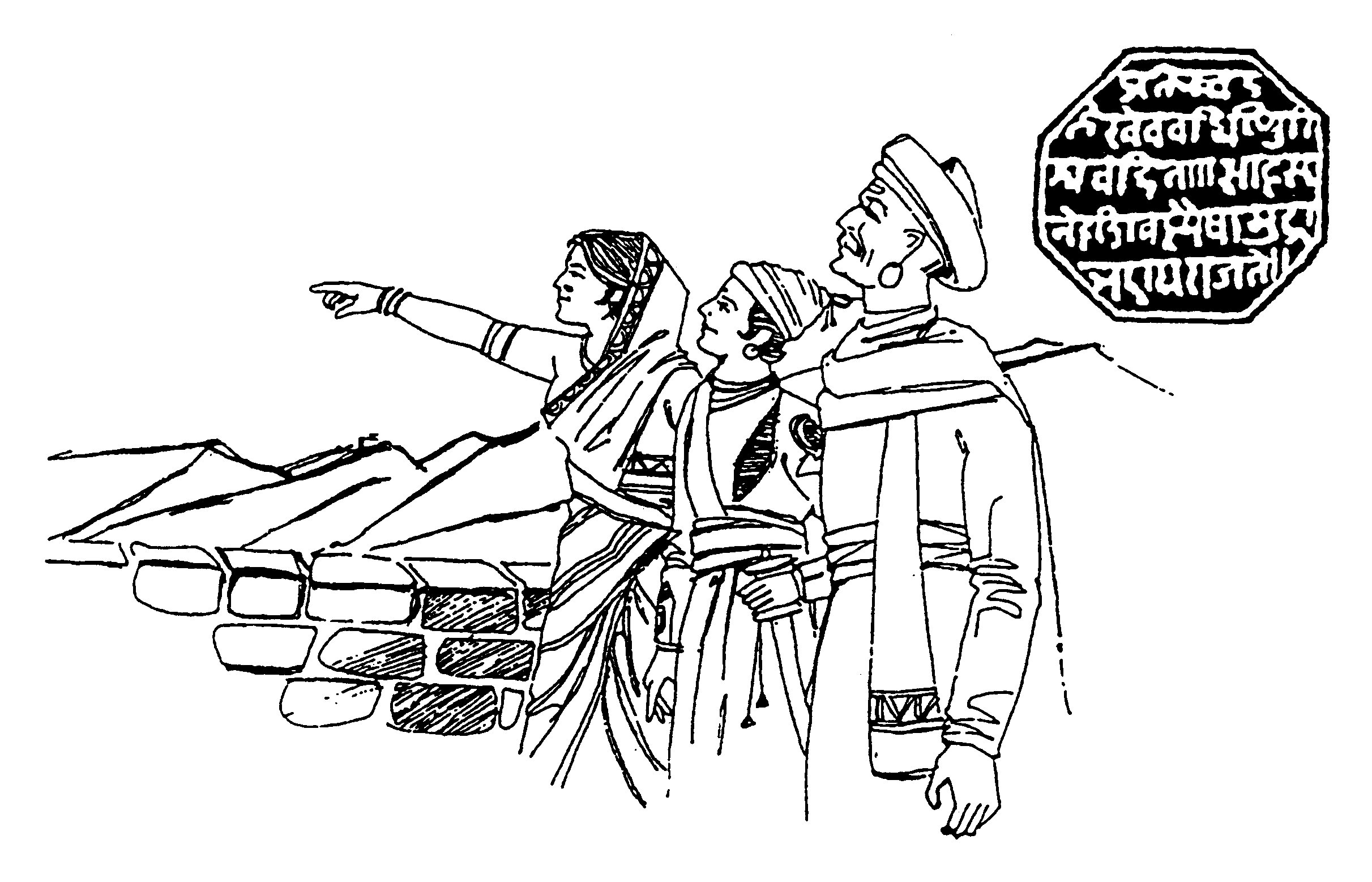
Shivaji Maharaj has a position of great importance in the history of Maharasthra. Maharashtra was established by him in the seventeenth century.
Shivaji was born in the year 1627. For three hundred years before his birth the Muslims were ruling everywhere. Even the Marathi noblemen were employees of Muslim Kings. It was in this sort of difficult situation in which Shivaji's birth took place at Shivneri Fort. His Father's name was Shahaji Bhosle and his mother's was Jijabai.
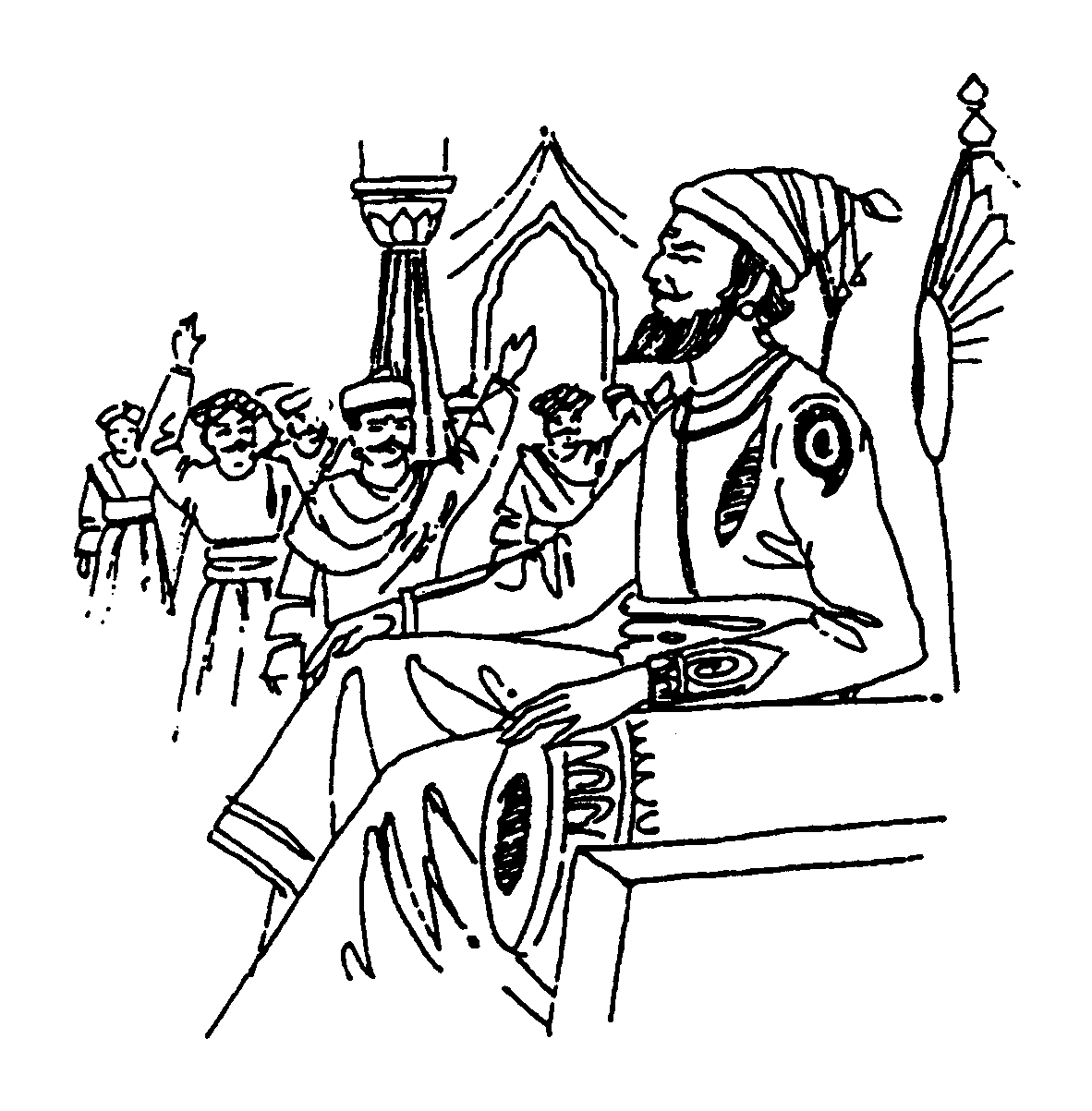 Shahaji Raja was feudatory of a Muslim Kingdom at Bijapur. Jijabai took the young Shivaji and was living at Pune in the Lal Mahal ('red palace'). That is where his education took place. There he studied religion, culture and history. Shivaji's teacher's name was Dadoji Kondadev. He taught Shivaji statecraft. Moreover, he informed him about weapons and taught him the science of war.
Shahaji Raja was feudatory of a Muslim Kingdom at Bijapur. Jijabai took the young Shivaji and was living at Pune in the Lal Mahal ('red palace'). That is where his education took place. There he studied religion, culture and history. Shivaji's teacher's name was Dadoji Kondadev. He taught Shivaji statecraft. Moreover, he informed him about weapons and taught him the science of war. Shivaji Maharaj was courageous and full of thought. He had respect for all religions. On June 6, 1674, Shivaji's coronation took place at Raigad. Shivaji fought many battle with the Nizam of Hyderabad, the Bahamani kings, and the Mughal kings of Delhi and he won many forts.
Shivaji died on April 3, 1680.
VOCABULARY
Nouns
Adjectives and Adverbs
Postpositions
-
-
Verbs
WORD STUDY
In regard to violent death the expression
| | Seven people were killed in the railway accident |
GRAMMAR
The plural oblique.
By now you have become thoroughly acquainted with the principal that before the addition of a postposition, pronouns and most nouns have to be changed into what is called their oblique form.
In Book 1, Chapter 36, you were introduced to the oblique forms in the singular for the most common categories of nouns in the three genders. Let's look now at the corresponding plural oblique forms.
The first thing to note about the oblique of plural nouns (and pronouns) is that is chiefly marked by the addition of the nasal, 'n' indicated by the
(m. resp.)
(f. resp.)
Of course the essence of showing respect is to use plural forms. But of course plural forms are also used in and of themselves outside the context of showing respect.
Just from carefully studying the examples above you could extrapolate for yourself five or six of the most important (i.e. prevalent) categories of the plural oblique. But let's list the principal categories by gender. The examples will all use the postposition -
| Noun category | sg. | oblique | pl. | oblique |
| Neuter Nouns | ||||
| 1. Ending in a consonant | | | | |
| 2. Marked, ending in | | | | |
| Masculine Nouns | ||||
| 1. Ending in a consonant | | | | |
| 2. Marked, ending in an | | | | |
| 3. Ending in an | | | | |
| Feminine Nouns | ||||
| 1. Ending in a consonant f. (i) | | | | |
| 2. Ending in a consonant f. (e) | | | | |
| 3. Marked, ending in an | | | | |
| 4. Ending in an | | | | |
These categories cover the vast majority of nouns in Marathi and should take you a long way towards mastering this complexity of Marathi grammar. At the same time you need to know that you can use Marathi intelligibly (if not elegantly) even well before your mastery of the oblique forms is complete.
a. One by one around the class in a chain
Have a dialogue on the text above. Here are some questions you might use:
b. Group activity
1. Reconstruct the biography of Shivaji and discuss his special achievements.
2. Give a biographical sketch of some famous Americans using the example of the reading
c. Fill in the information in the table below. Read this information in complete sentences.
| | | | |
| | |||
| | |||
| | |||
| | |||
| | |||
| | |||
| | |||
| | |||
| | |||
| | |||
| | |||
| | |||
| |
d. Small group.
Carry out a conversation : One person in the group will play the role of the Indian government officer and ask questions using the parameters given below. Others will play the role of an Indian or American citizen.
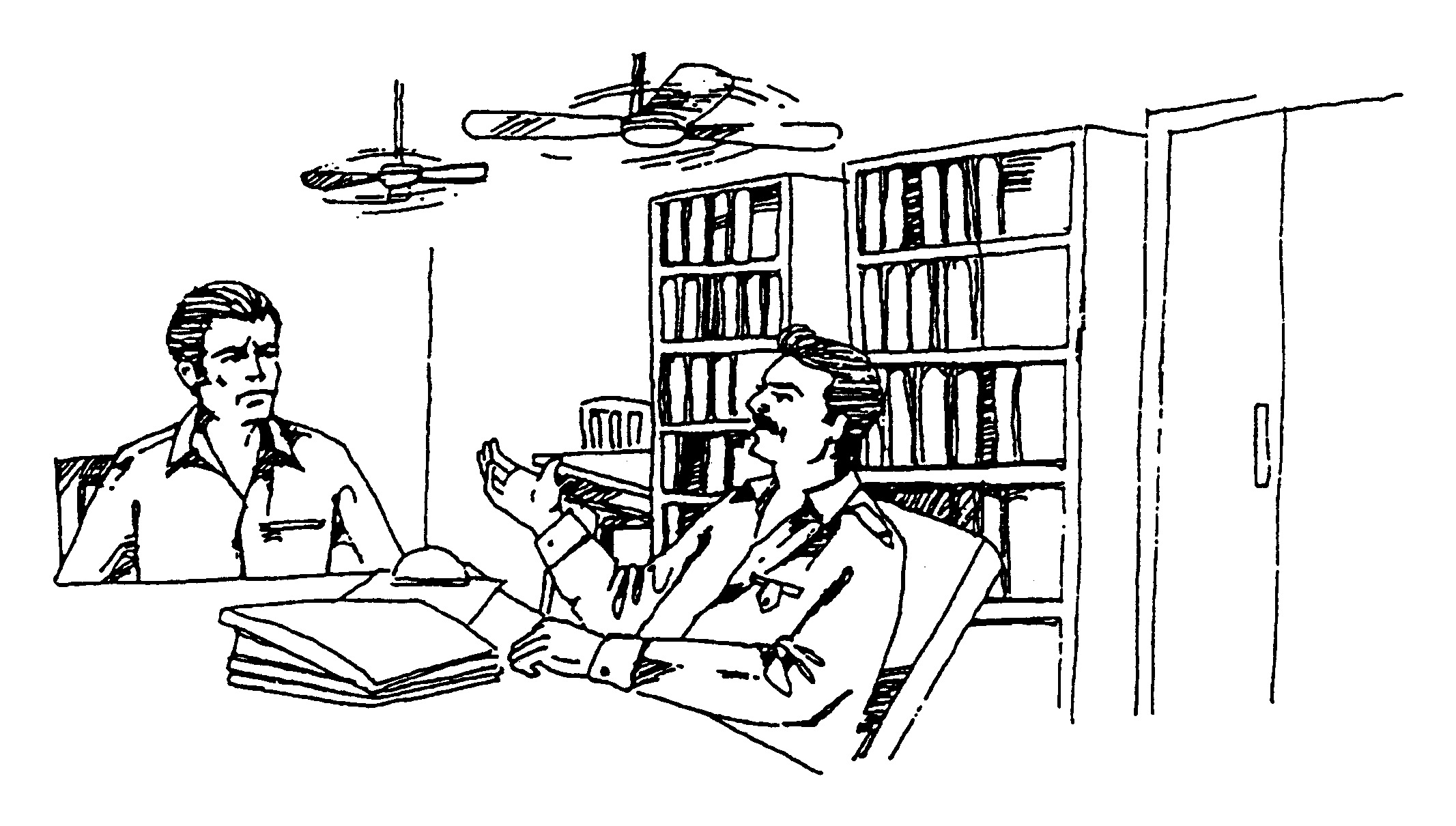 IndianAmerican
IndianAmerican e. One by one around the class in a chain.
Transform the following sentences using perfect forms of the verb
a.
b.
f. Find literary alternative forms in the third person neuter singular in the text
Do you get it?
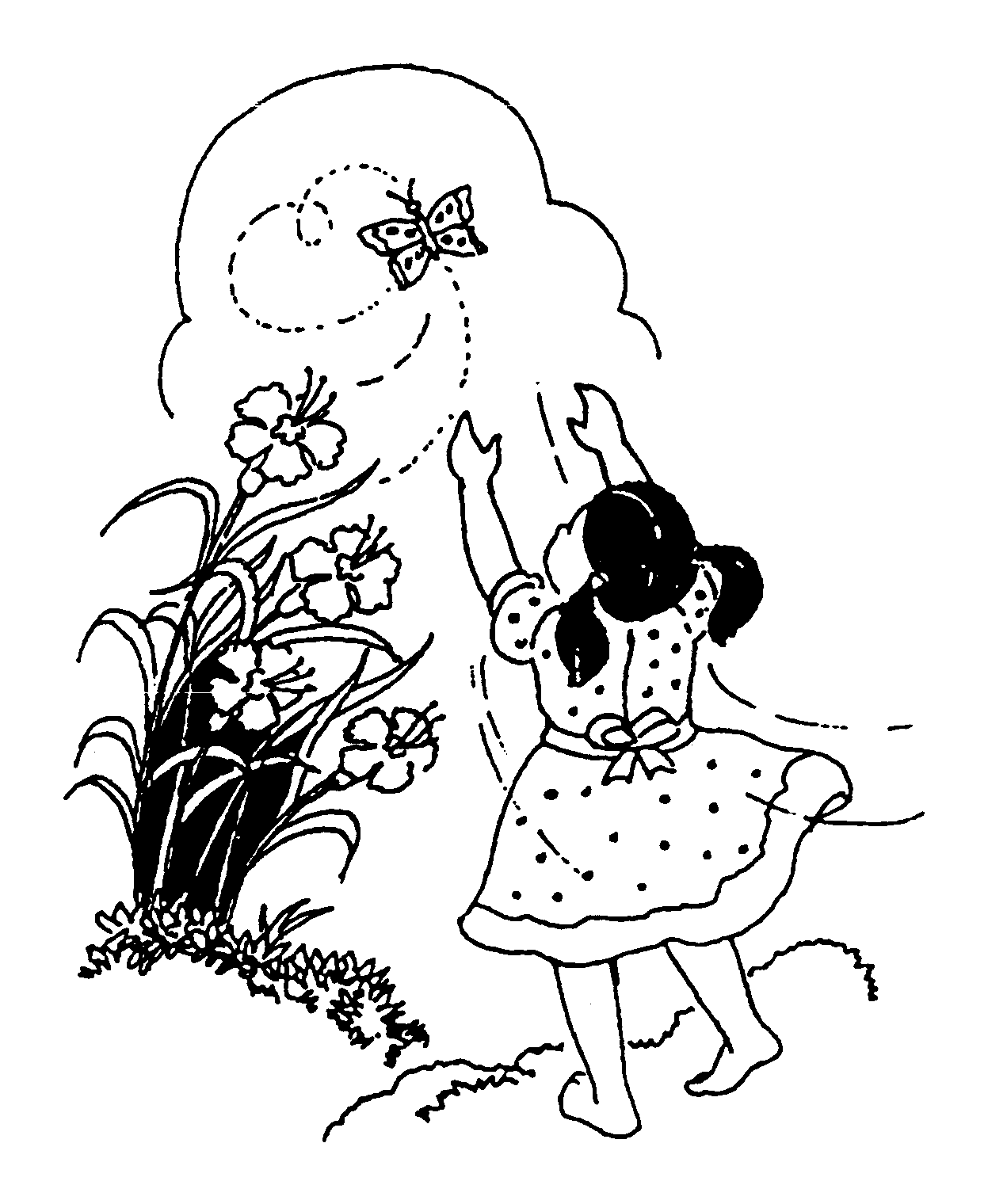
छान किती दिसते। फुलपाखरू
गोड किती हसते । फुलपाखरू
हालवुनी झुलते । फुलपाखरू
गोल गोल मणी जुणु ते । फुलपाखरू
दूरच ते उडते । फुलपाखरू
The butterfly
The butterfly! How charming it looks! The butterfly.
On these flower vines, how sweetly does it smile. The butterfly. tiny little navy-magenta wings it seems to swing. The butterfly.
Its sparkling eyes pearls. The butterfly.
Its flits away quickly each time I reach for it. The butterfly.
Unit Seven
Planning
You should be able now to make your own way through this dialog.
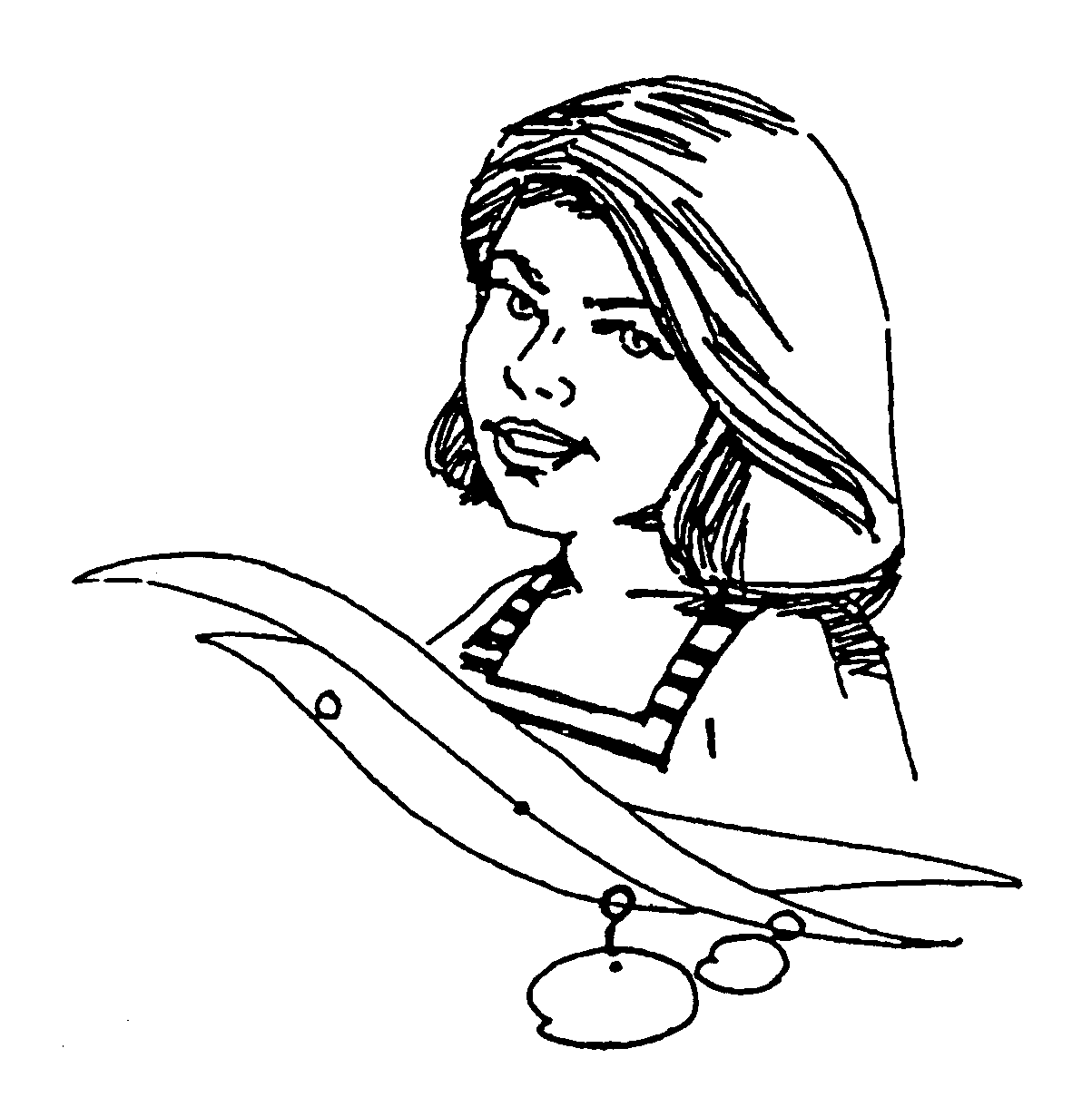 -
- *
-
*
-
*
-
*
-
*
| | The Indian Way |
| - | - Sarah, you've already returned ('gone and come') from Ellen's? |
| * | * Yes. She had a really nice birthday. |
| - | - Did a lot of people come? |
| * | * Yes. There were 25-30 people. Her relatives and her friends came. |
| - | - Which of the relatives came? |
| * | * Her aunt (on her fathers' side) and her boys, her maternal uncle and his wife and three children, as well as her maternal aunt's two girls. |
| - | - You mean her cousins on her mother's side came? |
| * | * Yes and 8-10 friends. |
| - | - Gosh! In other words they pulled out all the stops to celebrate her birthday! Did they celebrate it the Indian way or by cutting cake the American way? |
| * | * Altogether in the Indian way. I mean her mother put kumkum on her forehead. And she had arranged lamps on a tray. |
| - | - You mean her mother waved the tray of lamps in front of her? |
| * | * Yes. That's right. Exactly that way. |
| - | - What clothes had Ellen put on? |
| * | * Her mother had dressed her in a nice green silk sari. Ellen was looking very nice in a sari. |
| - | - Indeed! So she wore a sari! Wonderful! O, the Lucknow kurta you gave her - did she like it? |
| * | * Yes, a lot. |
| - | - I'm so glad, she liked out present. |
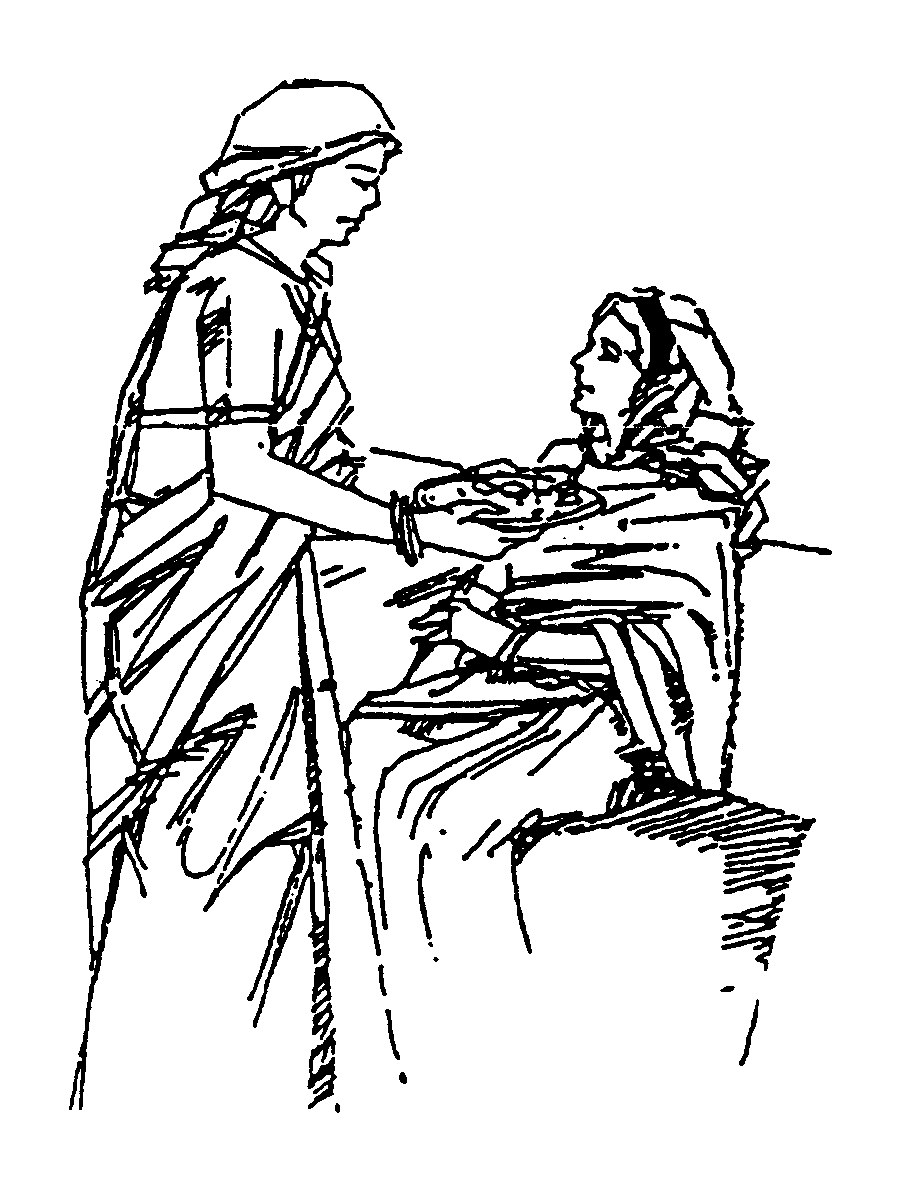
VOCABULARY
Nouns
Adjective
Interjection
Verbs
GRAMMAR
The interrogative
The position of the interrogative pronoun
| | Has he come? |
| | Why has he come? |
| | Did savita smile? |
| | Why did Savita smile? |
a. In Pairs.
Practice the above conversations.
b. Group activity
Use constructions without a subject while comparing the methods of celebrating birthdays in Maharashtra and America.
c. In pairs.
Practice the following conversations, then use them as the pattern for making dialogs of the suggested scenarios following.
| Example 1 | Example 2 | ||
| A. | | A. | |
| B. | | B. | |
| A. | | A. | |
| B. | | B. | |
| | |
| | |
| | |
| | |
| | |
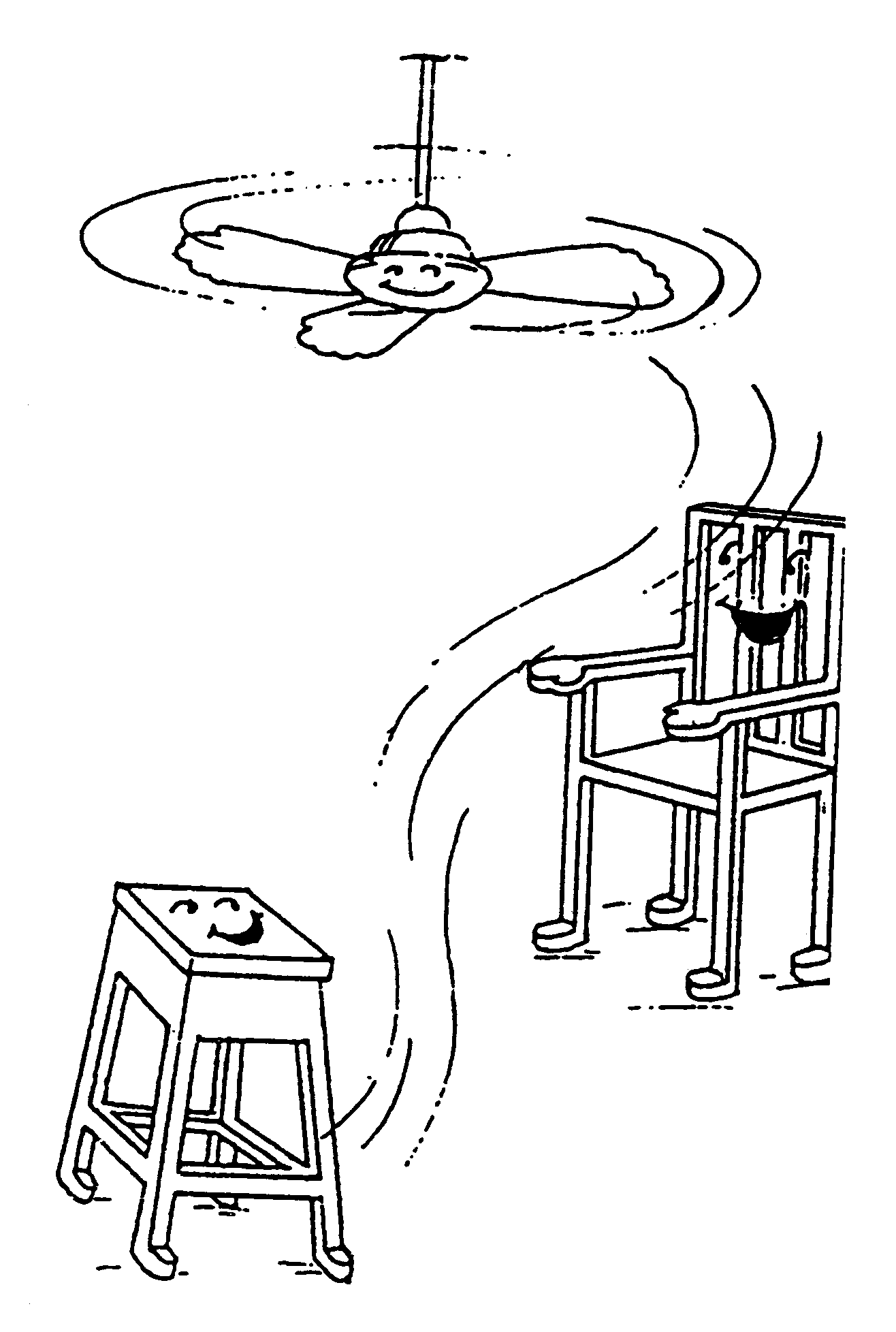 The chair said, 'Hey there, stool,
The chair said, 'Hey there, stool, When will you ever be able to walk?'
The stool said, 'The very same time
When you can clap your hands!'
Hearing this the fan just smiled-
He may lack feet but he keeps going round.
VOCABULARY
Nouns
Conjunction
Verbs
GRAMMAR
V +
You are already familiar with the V +
| | When will you be able to walk? |
In such constructions V +
| | When will you be able to walk? |
a. One by one around the class in a chain
Construct sentences following the pattern given.

b. Replace the V +
| | |
| - | - Ramesh, at present we have classes in the morning each day. Which means the afternoon is free. |
| * | * Well then, Soniya, what are you going to do in the afternoon? |
| - | - I'll go to the library two days. Also, I'll meet people. For my project. |
| * | * So the remaining days are free? Then why don't you go learn the Tabla? |
| - | - Rather than that shall we go together to learn dance? |
| * | * No. Go by yourself to learn dance. But shall we go together to learn yoga asanas? |
| - | - Yes, OK. Two days for dance and two days for asanas. What will we do evenings? |
| * | * Evening I'll have time. Let's go out to walk around, to see plays, listen to songs, shop or else to eat out. |
| - | - Yes. My American friends often go out to eat Chinese or Italian. But I like Indian food. |
| * | * Then learn to do Indian cooking. |
| - | - Would your mother teach me to do Indian cooking? |
| * | * Yes, of course she will. Let's tell her to teach you cooking. |
VOCABULARY
Nouns
Adjectives and Adverbs
Postpositions
-
Interrogative
GRAMMAR
V +
In the preceding texts we have come across this form:
English equivalents to V
a. In pairs.
1. Use the pattern of the conversation above discuss what to do in your own free time.
2. Plan a program for a holiday using the following pattern and the vocabulary given in parentheses.
(
b. In pairs.
Carry out a short conversation in the pattern given below. Use the V
(
c. One by one around the class in a chain.
Form sentences according to the pattern given below.



मोठी तिची सावली
लुकलुक ही पाहते
गुबरे गाल फुगवीते
अंग काही धूत नाही
भात केला, करपुन गेला !
तूप सगळे सांडून गेले
थांबा करते गोड खाऊ
दोनच पडले दात
धपकन् पडली आत !
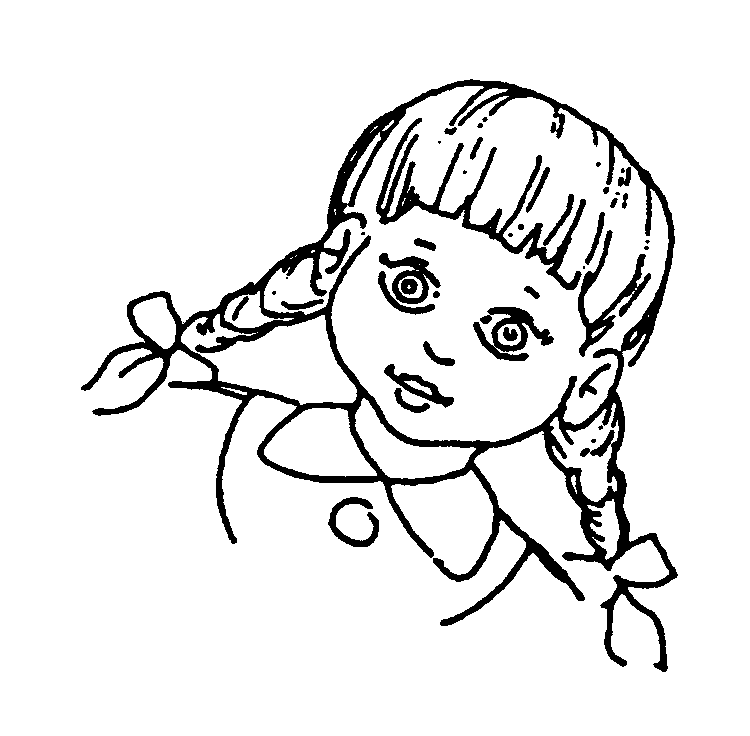
My doll
My doll is so small. But her shadow is big. Her light blue eyes twinkle. With her button nose she puffs up her chubby cheeks.
She never brushes her teeth or takes a shower.
When she made chapattis, they were underdone, when she made rice, it burned.
When she made 'varan', lentil soup, it was to thin and the ghee all spilled out.
Don't go hungry. I'll make some sweets for you to eat.
Then, when she went to make bananas in milk, two of her teeth fell in.
She went to fetch some water from the well and plopped into it herself.
What Are You Saying Meaning in Marathi
Source: https://www.lib.uchicago.edu/e/su/southasia/marathi/marathi-in-context.html
0 Response to "What Are You Saying Meaning in Marathi"
Post a Comment